#i choose reflect on an audience as That Character is so important. there are some ppl i Am confident writing and getting right (shuuichi)
Text
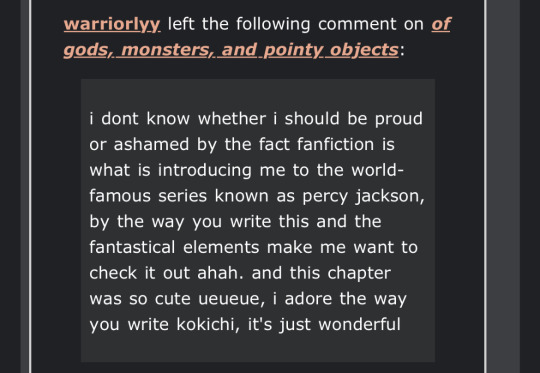
i couldnt get to sleep last night so i saw this one in my email as it came in and its just. kisses it. frames it. it has broken down all my defenses
serious note: this is exactly the kind of feedback that genuinely is really encouraging, because not only am i having fun writing it — people are having fun reading it! i’m really proud of pointy objects, but it being enough to convince multiple people (!) to want to read the source material because they like my interpretation so much. sobbies into my hands this is def the kind of comment i save and reread because it makes me happy. thank u 🫶
#pointy objects#un ange#this is where i admit i Also havent read pjo….haha…..i have seen the musical and love the soundtrack so i CAN full throatedly recommend it#read pjo tho its a classic. the box set (signed by tlt musical cast Not to flex aha) sitting on my bookshelf. ill get there eventually#also while hiding in the tags: hearing positive feedback on my characterization is literally a critical hit to my heart every time. getting#a charas personality and voice and Vibe down is probably what i focus most on while writing. getting into their head enough that the words#i choose reflect on an audience as That Character is so important. there are some ppl i Am confident writing and getting right (shuuichi)#(kaito)(kaede)(komahina but thats less relevent here) but kokichi has never been one of them! im very happy with what ive put out so far#(gods above have i spent so much time on his wiki reacquainting myself with his voice) but hes a very unique and distinct character.#hearing that im doing him justice and that he comes across as and feels like kokichi. very important to me and it makes me very very happy#to get the validation there. i love writing him and its nice hearing that thats earned. Ok im shutting up now but#warriorlyy i love you im sending you good vibes beams with my brain
5 notes
·
View notes
Note
how do you feel about march eridan?
Ok disclaimer before I get into it, trolls wearing dresses = great and fantastic; in fact, given that the gender differences in troll culture are so much less significant, ALL the male trolls should own some femme-ass clothes, even if it's as simple as just having a skirt version of their pants, and it's a little lame that we didn't get that.
That said, March Eridan specifically kind of annoys me because it has 0 basis in canon (aside from some shoutouts in things like ministrife sprites) but has taken over Eridan discussions so wholly that it's become widely accepted as part of his character that he's really into femme stuff when the opposite is true, and he's got some pretty major characterization tied up in the fact that he does lean so masc, and what specific type of masc he tends to present as.
So first of all, Eridan dresses up to emulate Dualscar, and this is very obvious and straightforward; if you've read the big essay I have pinned to my blog, you know that this is all a part of his basic "I have to be a big bad sea dweller or Something Bad Will Happen" suite of issues.
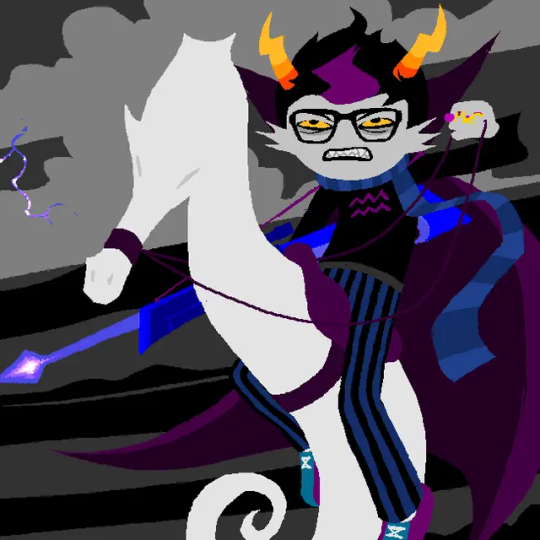
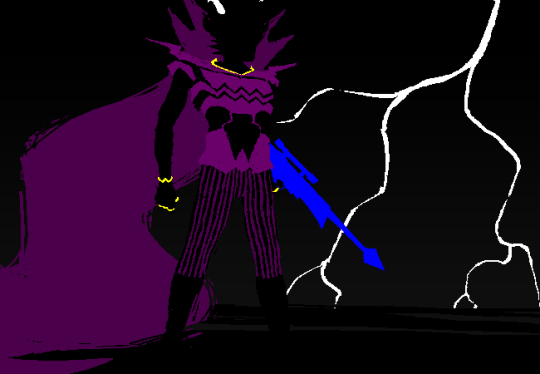
Thus, we can ALSO assume that the choices he made that aren't made to emulate Dualscar are reflective of his ACTUAL taste in clothing. For example, blue pants instead of purple and black - I believe that this is because Eridan likes to dress up in the blood colors of his dates; he wears a lot of blue because he's hatedating Vriska (and never quite seems to get 100% over her), and we also see this in the rings on his fingers - half of which are fuchsia, for Feferi.

So that leaves us with the glasses, shoes, and scarf. And we know why he dresses like that! It's because he's a hipster. (The scarf has an added benefit of being associated with harry potter-style wizards).
CCG: PAST YOU, PRESENT YOU, FUTURE YOU
CCG: AND ABOVE ALL, UGLY SCARFNECKED DOUCHEBAG HIPSTER YOU
CCG: WAIT I FORGOT, ALL OF THE YOUS ARE THAT YOU
And very specifically, a masc hipster from the era - the glasses and the ugly-ass shoes are dead giveaways. The slicked-back hair is reminiscent of that fashion style, too. He is also a douchebag. This too is important. He draws from character archetypes of the time that were generally agreed upon to be the most punchable people in existence; his introduction calls him "KIND OF A TOOL" and he consistently acts according to that. Like, I mean, just LOOK at those shades. Those are not the shades of somebody you want to be trapped in a conversation with.
A fairly accurate Eridan fashion board would look something like this:


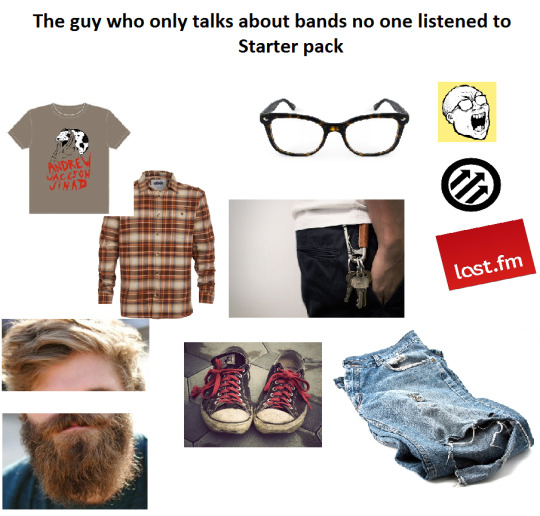
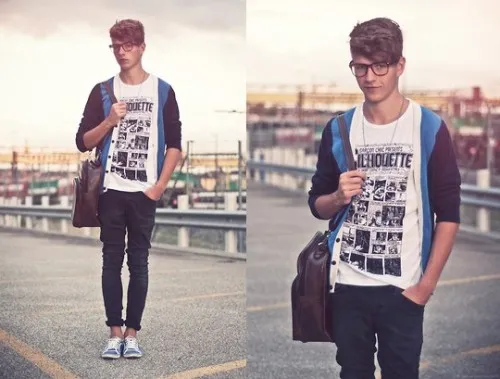
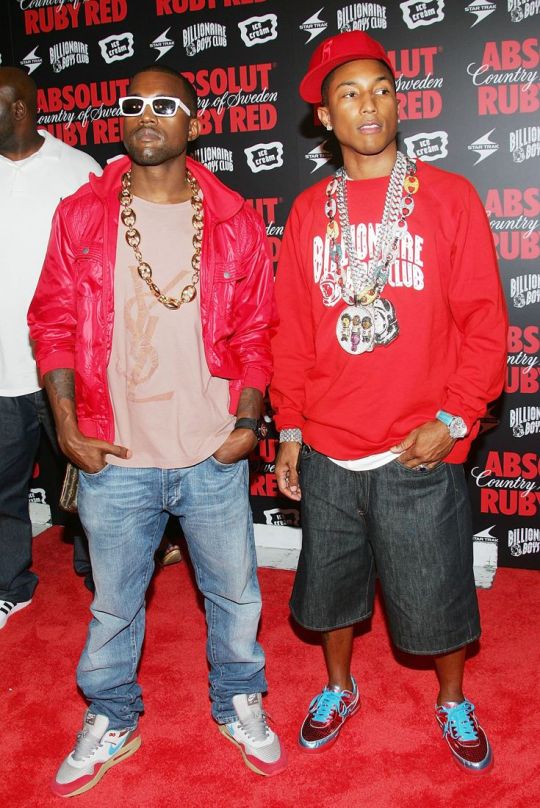
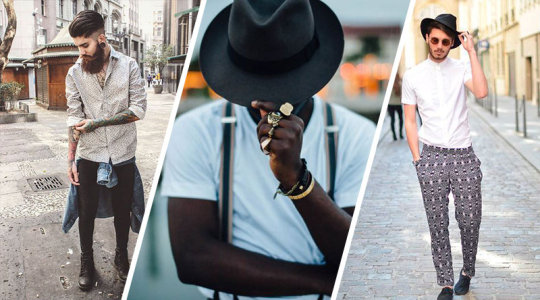

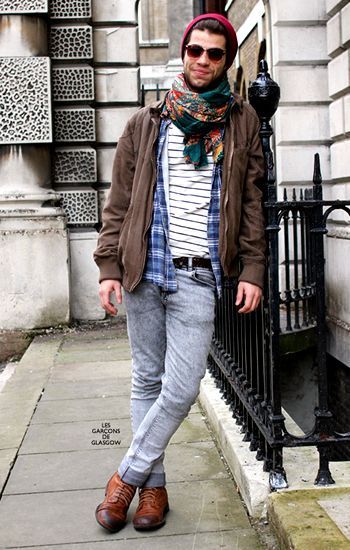

And, like, it kind of matters that he dresses like this specific breed of pretentious male douchebag; on a meta level, that's the impression he's supposed to give the audience, and on a diegetic level, he CHOOSES to look like this because he has these kinds of interests, but is relegating them to secondary accessories.
We never hear him talk about liking hipster shit; we have to hear it from Karkat and glean it from his design. This is because, as I've talked about before, he actively distances himself from things that make him happy, things that he'd enjoy. The constant push-pull between his ACTUAL interests, and the ones he thinks he has to have because he's supposed to be a big nasty sea dweller, is a huge part of his characterization - for example, the way he keeps claiming that magic and wizards are fake and shitty, but has no less than 6 wizard statues in his respiteblock alone, and cared about his crappy wands enough to bring them onto the meteor.
So that's one of my other issues with March Eridan and the general fanon that he'd be really into femme clothes (and, by extension, fashion) - he wouldn't be forthcoming about it, even if it was true. He has a deep sense of shame and insecurity surrounding what few interests he actually has, because they feel stupid, ridiculous, and frivolous, next to the intense anxiety he has about playing the role society gave him. He's got a very strong sense of duty that makes it very difficult for him to relax and actually enjoy something. Which, you know, probably feeds into his hipster-ness - a movement often defined more by what it doesn't approve of than what it does.
Canon Eridan, when he has a choice of what to wear, overwhelmingly chooses masculine clothing with hipster connotations. And this matters, it's part of his characterization, it says something about him, the same way that it's important that Karkat dresses very simply and baggily (we all know how many insecurities Karkat has about his body) or that Sollux's bifurcation is shown in his clothes. So please please please don't misunderstand my dislike of March Eridan as me saying I don't want him in dresses; I purely dislike it because it's usually SUCH a misread of his character.
And to prove it, here's my other gripe with March Eridan stuff: all the dresses shown in the not-canon "official" artworks don't even flatter his bodytype. Why do his custom mannequins in Pesterquest have CURVES when his Pesterquest sprite doesn't?????
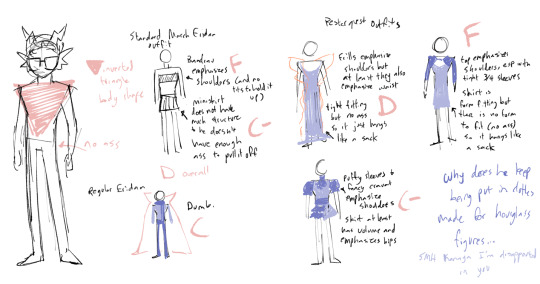
Please, I'm begging you, there are guides for dressing this body type, and even historical fashions that deliberately try to emulate this body type, please if you're going to dress him femme and HC that he enjoys fashion, please put him in clothes that flatter him please
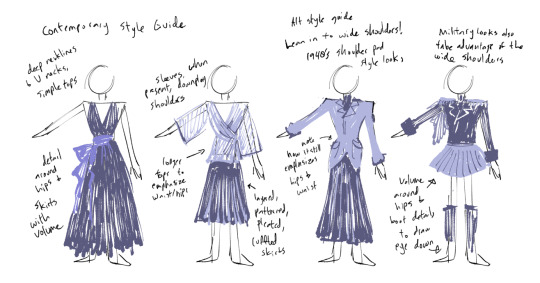
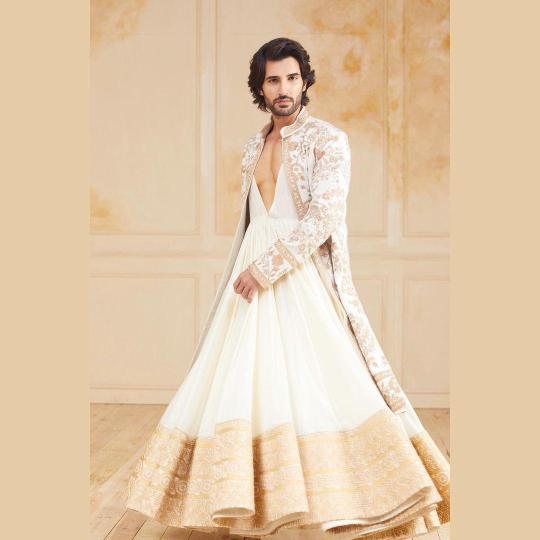
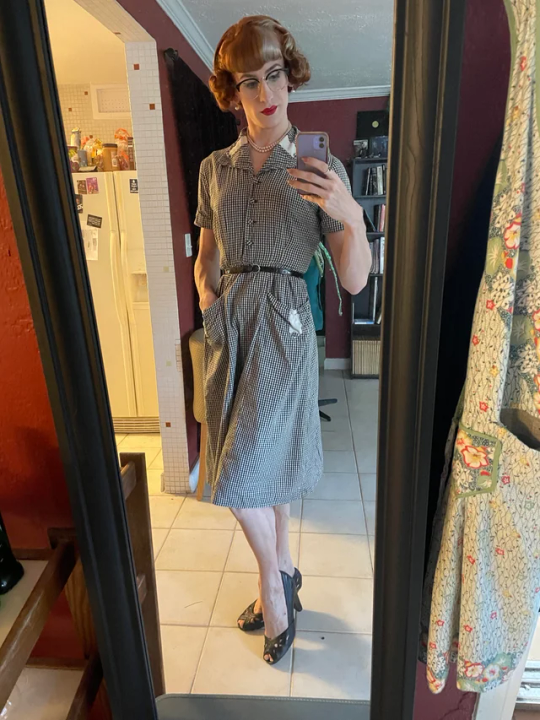
I think Eridan should own some femme clothes, because on Alternia, there are very few differences between the genders, he's rich enough to afford it, and he clearly has more of an interest in fashion in general - but I think the fact that he has a clear canon preference for masculine styles is significant, and I'm really annoying, so it kind of does bothers me that this is a controversial opinion. That being said, I don't want to tell people what they Should and Should Not do, because that's lame. Who cares. He's a fictional character, let people draw him in dresses. Would be very happy if this post causes people to draw him in different styles of dresses though :pray:
#I'm not going to tag this#because also people playing around with putting Eridan in dresses is 100% harmless#and i'm not going to ruin the fun by going But The Canon Says -#i'm just really really really annoying about canon and i kind of assume people follow me for that reason#but please dont let my annoyingness hamper your fun#if you enjoy putting eridan in dresses then by all means keep doing it#peace and love and rise above
164 notes
·
View notes
Text
If you are an Avatar fan then you’ve probably been rather bewildered by the unaccountable animosity that has developed toward Spider. What’s obvious is that the brains of some moviegoers are rather blank slates.
Here’s the thing—Spider Socorro’s arc in the film requires some reflection and analytical thinking on the part of the audience. Automatically labeling him a traitor or a Terrible Person demonstrates a lack of effort to understand this complex character.
Of course, it is natural that we may find ourselves frustrated with Spider for seemingly going along with the RDA/Recoms and for saving Quaritch’s life. After all, those are the bad guys! But if you take the time to analyze some of the plot points and Spider’s own personality and history, you can better understand his motivations.
Here are a few key takeaways to help you empathize with Spider’s choices. I think most Avatar fans will have already picked up on these.
One: Early in the film, Spider is kidnapped and interrogated by the RDA. An interrogation that borders on physical and mental torture. This is a sixteen-year-old kid who has never been in that kind of terrifying situation, so of course he’s going to take the first opportunity he has to escape, even if it’s with the Recoms on their mission to hunt down the Sullys. Anything to not be handed back to the lab coats, right? But even then he is still being held hostage by Quaritch, who places a tracker inside his Exopack to keep tabs on him. Spider is smart—he knows he has no choice but to tag along with the Recoms.
Two: It’s important to recognize that despite having spent his whole life on Pandora growing up in the forest among the Omatikaya People—befriending the Sully kids, painting blue stripes on himself, and speaking their language—Spider knows he is still just a human. And even though he has a confident personality, it is reasonable to assume that there are times when he feels different or inadequate. Sort of an “I need them, but they don’t necessarily need me” kind of situation that many of us can relate to.
But now Spider finds himself surrounded by a group of foreigners from Earth, who it turns out appreciates that he is Pandoran. Appreciates that he operates with the knowledge and physical capability of the Na’vi. Here he can prove his worth and skill, and it’s obvious that Spider gets caught up in the feeling of being useful (and of being smarter than the Recoms, because let’s admit it, Spider can be a bit cocky 😆).
However, this is only the case until he witnesses the violent potential of Quaritch and the Recoms in those heartbreaking scenes where they destroy Metkayina villages and murder Ilus. Spider has a wake-up call at this point in the film, and it’s here that he actually stops “helping” the RDA.
Three: Saving Quaritch from drowning. Spider’s decision to rescue Quaritch at the end of the film boils down to two inconvenient but very realistic and credible reasons.
A – Quaritch is his father. We cannot try to claim that a son choosing to save his father from death is an evil or traitorous act, even if the father himself is evil. Especially a father who potentially just saved his son’s own life, because I don’t think Neytiri was bluffing during that standoff. So yes, he’s clearly not happy about it, but at that moment Spider accepts that Quaritch may have saved his life, so in return he saves him from drowning.
And B – the simple fact that Spider is a good person.
In addition, I think some people have overlooked that at the end of the film, Spider ditches Quaritch and returns to the Sullys without hesitation. That speaks for itself to the resolution of his arc in this film.
So there you have it. I wanted to contribute this to the discourse in the hope that it might sway a few minds. Spider is a fascinating character, particularly because of his intrinsic relationships with both the heroes and villains of this story. Saving Quaritch’s life has put him in a really tough spot, and I don’t think this character is finished being caught in the middle. I’m very excited to see where Spider’s story goes.
Amazing writing James Cameron and amazing acting Jack Champion!
💙
2K notes
·
View notes
Text
So something that I often don't see people discuss is the manner in which the 9th and the 10th doctor's seasons are so intrinsically connected that it is almost impossible to understand a lot of key character arcs if you choose to skip it upon rewatch. The reason why I say this is because the moment you reach season 2, 10 is essentially the product of the development 9 achieves at the end of his season. To skip him, would mean that you also miss context as to the reason why Rose is so important and in turn, not understand the reason why their bond in particular is such a big part of the plot during the 10th's era.
Now bare with me, because I'm about to go off a bit lmao.
The first season of nuwho not only serves as an introduction to many of the key characters we see later on, such as: the Doctor, Rose, Jackie, Jack, Mickey, Harriet jones, etc. but it also serves as an introduction for the concept of the series as a whole. Prior to this, doctor who as a franchise had a reputation of being a geeky sci-fi show with no real wide spread appeal. Remaining as a niche interest to many, up until the reboot returned and reintroduced the show to a newer audience.
This is important to note because this is one of the main reasons why we see such a huge emphasis placed on the companions' lives in the reboot. Because RTD meant to expand the world of Doctor who and its audience, and by doing so, he strived to try a multitude of new plots that were otherwise never explored previously. This is why the romantic plotline of his season is so crucial to the story itself because he means to explore a facet of humanity not previously seen with the Doctor as a character. RTD essentially built this plot line from scratch, as the only other attempt at exploring such an angle was received negatively (The 8th Doctor's movie). So there's a degree of leniency that I give his writing In particular because like I said prior, he had no prior reference for exploring humanity to the degree in which the new series does.
The ninth doctor, when we meet him, is essentially a recluse. He is in a state of stagnation, implied to have been alone for some time after the war and it gives off the impression that he's no longer accustomed to being around people. He's often direct, rudely so and very standoffish to anyone that isn't immediately measuring up to his standards. This isn't to say that he isn't charming in his own way. He's sarcastic and when he tries, he can actually be very good with people. But the war still weighs heavily on his conscious and so, he views the world through the eyes of a soldier. Prioritizing the act of surviving rather than slowing down and actually taking the time to live life.
I mean, the man essentially meets Rose while blowing up her workplace and if that isn't concerning on its own merit than I don't know what is lmao.
A scene that sticks out to me the most about him in particular is when he looks at himself in the mirror for the first time. He notes that he has big ears, and from the manner in which he says it the implication that he perhaps has not seen himself in a long time is not lost to us. This coupled with the knowledge that he had indeed been seen traveling prior to meeting Rose, gives the phrase a more dark connotation that makes sense for his character.
I like to think that this indicates that the guilt of what he did to stop the war weighs so heavily on him that he could never bring himself to face his reflection. Because truly, to have gone so long without seeing yourself, not even in the reflection of a window or other surface is not something that is easy to do. Rather, it is something you have to go out of your way to do. Also it's important to note that his appearance is in fact a reflection of that weariness he feels. With his body, being older outwardly (appearing 40ish ) and his features being very sharp and serious. Even his hair is pretty short, much like how a soldier would keep it as a means of not wasting any time on worrying on something so inconvenient. His preference for darker colors and his constant outfit is also very noticably practical, not at all decorative like his prior bodies. This is purposeful, because it is what sets him apart from prior versions of the character and an easy way to visually see his most prominent traits.
Now with that out of the way, now I can discuss how 9 changes and what his relationship to Rose is like, so that one can better understand why Rose is such an important part of the Doctor's character.
From the moment the two meet, you can see he harbors an immediate curiosity towards her. Here they are, trapped in an elevator being attacked by a group of living mannequins and yet, Rose is almost unaffected.
That isn't to say she isn't afraid, she is, but her fear doesn't stop her from asking questions and demanding explanations. She doesn't shy away from him, rather she confronts him head on and even shows a level of concern for other people while she is actively the one in danger. It is enough to prompt him to ask her name, but not enough to involve her. Preferring to instead keep his distance.
It is not until another chance meeting that he gradually lets her in, allowing her to humor him with her curiosity and we see once more that he is in fact very good at socializing, but only with certain people. The reason why I stress this is because he often outwardly puts this front of coldness towards those that don't interest him. Rose was able to look past this front, and seems to look past his rather cold attitude towards other humans. He often stresses how inept they are, going on tangents about how they're nothing more than apes but she ignores it and tries to get at the core of the issue. That's why they mesh so well, because she is able to separate the fluff he inserts into his answers and take it for what it is. That isn't to say she's a doormat, she just knows when to pick her battles.
"do you know like we were saying? About the world revolving. It's like you're a kid, the first time they tell you that the world is turning and you just can't quite believe it cause everything looks like it's standing still. I can feel it. The turn of the earth. The ground beneath our feet is spinning 1,000 miles an hour and the entire planet is hurtling round the sun at 67,00 miles an hour. And I can feel it, we're falling through space you and me. Clinging to the skin of this tiny little world, and if we let go.. that's who I am. Now forget me, Rose Tyler"
He is describing the manner in which he views the world. Unlike how a kid is unable to comprehend the vast truths of how the world functions and remains naive of it for a period of time, he is a man that was never given that chance to be unaware of how it functions to an infuriating degree. He sees the world for how it is, dark, unforgiving and so direct. Everything is calculated so precisely and he can't even begin to comprehend why anyone would see the good in it as it's just that, a planet.
But that's why he finds humans so interesting. There's a part of him that holds onto that hope that it is something more, that perhaps he is missing out on a purpose behind all the darkness. That's why he is running amongst them, to find a reason behind their way of thinking. To experience the world through the eyes of the hypothetical child, rather than the adult who breaks the illusion.
Not only that, but this conversation also let's us in on how touch-deprived he is.
For it is in a moment of vulnerability that he allows himself to reach out and touch Rose physically. Grabbing her hand for emphasis on how heavy this revelation burdens him. It's a cry for help in a sense, because he has reached the point where he has metaphorically "let go". Dropping her hand, to show that he is losing that last part of him that clings to that hope of finding something that will allow him to question his view of the world. He is miserable and lonely, because when you view the world through such a cynical lens it becomes all the more apparent that life is so lonely. If everything is doomed, then why go out of your way to care?
You see this in the way he remains unaffected by the reveal of Mickey's "death." Having grown so used to it, that he finds it off-putting to see that Rose is freaking out as a result. It happens everyday to people far more important so why give it any real weight if it's inevitable? Why ascribe a meaning to something that just is?
Remember when I mentioned it is implied that he was traveling on his own for a while? What places did he visit? The Titanic, the Kennedy assassination, the explosion of Karakota. These are all fixed points of time that are associated with absolute tragedies. But all the same, they're key points in life where the world remained cruel without reason. Thus fueling his very uncharitable view of the world and how it functions.
That's where Rose becomes key to his overall development. As a human, she inevitably views the world through the lens of that child. She doesn't know the ins and outs of the universe's processes, yet she continues living without ever really seeking to understand it better. It doesn't matter to her that the people around her aren't necessarily important in the grand scheme of things, they matter because they just do. She is capable of loving others and affording care to others simply because she wants to, not because she has to. She is confronted with alien threats the moment he walks into her life, and yet her view of the world and her existence doesn't really change. She does not harden rather, she curiously grows from it. Growing wiser and more aware rather than crippling under the discovery of another threat in the universe.
She is clinging to the understanding of the tiny little world she lives in, yet her hold doesn't relent. For she is not falling, to imply so would mean that he was right in his assertion that our existence is doomed. No, instead in the place of any real meaningful explanation about the world's existence is something so innately human: hope. An illogical thing to always maintain, yet she always seems to have it.
After all, it is such a confusing notion when you think about it. We have no reason to believe that things will improve, and that we'll be met with good outcomes. It's so metaphorical, not at all tethered to something practical like numbers and data and yet, even when the odds are against us, somehow we hope things will improve.
It's that aspect that he wishes he understood.
(i would love to dedicate a whole analysis on Rose in a separate post so for now, I will only focus on the Doctor and her role in his life)
This is why he takes her to the ends of the universe on their first trip. He's testing her, seeing if this will be enough to prompt a reaction out of her that fits his narrative. He also seeks companionship, to have someone understand what it's like to see your planet burn and to have yourself remain as the sole survivor. In a way, to justify the validity of his misery and guilt. She's affected of course. It's in that moment that she realizes, the scope of the universe and is faced with the undeniable truth that everything does end. It shakes her and you can see her sort of doubt her view of the world. No longer able to remain blissfully unaware of the big picture when it is quite literally in your face.
But something she has, and he lacks is a foundation. Rose still has her mother, someone to return to at the end of the day. She can be comforted by the people in her life while his inability to let anyone in, essentially stunts him.
When given the choice to spare Cassandra, he refuses. He lacks the capability of seeing past the evil, and assumes that there is no good in her. No second chances. An act that catches Rose off guard, who in spite of personally recieving the brunt of Cassandra's cruelty, she asks the Doctor to save her.
Eventually he takes her back to her time. He entrusts her with more information regarding the war and the death of his people. People pass them by, oblivious to his presence as he is wallowing in the sorrow of remembering. It's a metaphor, of sorts. While our two protagonists are brutally aware of the doom that awaits them in the future and they remain stuck in place reminiscing, the world around them continues moving on.
He is giving her every reason to run, to leave him behind and save the very last shreds of naivety she has.
But when he asks her if she wants to leave, to no longer accompany him on his adventures, she refuses. Because his confession puts it all into perspective.
He is hurting.
He desperately craves company: to have a hand to hold onto and keep him grounded as the world falls apart. Yet more than ever is she aware of her limitations; that she cannot undo what has been done to him.
And so, she does what she knows she can do to help ease the pain even if it is very miniscule. Tells him that he has her, and that his pain is one she can now share and understand. She offers him chips, not because it will magically make it all disappear but because it will distract him from the pain of remembering. It's also her favorite food, so no doubt she is trying to share that sense of comfort it brings her with him.
Such a human thing to not focus on fixing the bigger problem and instead focus on what can be changed in the current moment. They still have time until the end of the earth, so why spend more time dwelling on it?
That is her response to his question.
I believe the episode the unquiet dead is where he realizes the extent of his feelings for her. There they are about to be pulled apart by a horde of zombies yet Rose doesn't regret coming along. She tells him so and in the end all she asks of him is that they fight for their lives. Still clinging on to that bit of hope that they could get out of this, even if it is misplaced. To stay together in spite of their inevitable deaths is all she asks for, and he in turn tells her how glad he is to have met her. Assuring her that he is glad it's her that is there by his side as he clings to her hand like a life line. Somehow, having someone there to hold made the inevitable more bearable.
For a single moment, he remembers what it is like to not regret something.
But no, they live! Again and again, even if logically it makes no sense given how the world works. All the while, he meets more and more extraordinary people. With Rose, always reaching out to others as they embark on every new adventure. Thus indirectly providing him insight on the manner in which normal people are capable of doing brave and incredible acts even if it is at the cost of their own life. Their hope in a future for the people they hold dear, motivating them to put everything on the line if it meant that there was even a slight chance everything would be alright.
There's good in people, even those that outwardly appear to not be worth the trouble. And it's that potential he latches on to, and why he tries so hard to lend a hand when he can.
This is actually where the trend of the importance of knowing people's names starts, because the companions often serve as his connection to the humans around them. They ground his perspective, reminding him to not focus so much on the grand scheme of things that he forgets to look at the smaller details. This is why in the episode Midnight it is so tragic that no one asked for the stewardes' name. For up until that point, he knew better than to not at the very least humanize her (by asking for something as basic as her name, her story, etc.) rather than see her as pawn in the midst of the problem. That is the principal that Rose instilled in him and yet when left alone, he finds himself forgetting to do so. Thus, why he takes the revelation to heart.
But I'm getting ahead of myself lol
It is when he is confronting the last of the daleks that he has to reconsider his beliefs of how the world had up till now functioned. He has been proven time and time again that the world is not always such a negative place, and that there is at times tranquility that could be found in the midst of the chaos. That the universe and it's inhabitants are capable of doing both good and evil.
So why is he so quick to want to kill the last of the daleks and cling to that cynicism he was beginning to reconsider? Here he is faced with a being who understands his pain, but in the form of his biggest enemy. It is not innocent, having been at one time capable of monstrous acts that caused mass suffering but...neither is he. There it stands defenseless and unarmed and yet he is the one threatening it with a weapon, just like Rose reasons. She is alive and unharmed, standing next to a dalek yet the active threat is not the dalek, it's him. He is tempted to kill it because his first instinct is to resort back to that hatred that gave him purpose for so long. The same poison the daleks used to eradicate the rest of his people. But is it truly incapable of being good, if not, then why is he any different? To give into the temptation would mean to validate that goodness could not be found everywhere. That if he followed the same mindset that once drove him to pull the trigger on everyone involved in the whole war, than he was doomed to become one of them. To repeat the endless cycle of violence and prove once and for all that he is a monster that cannot change.
Again the answer to the question is up to us to decide. But for him, there's only one clear answer.
No one else has to die. By choosing to not do anything he can live another day, without carrying the guilt of another being dying at his hands. Not because it has to be done, but because he has the option to refuse.
He can no longer assert that its existence as the final survivor of his race isn't important. That just because he hates it, doesn't mean it doesn't deserve a second chance like he got.
Really who is he to pass judgement, when there was a point in his life where he too was blinded by rage and the very narrow view he held of the world?
There is always a choice, and sometimes, the choice is to not take part in that decision.
And so that's what he does.
Rose takes on the burden for him, reaching out to the dalek in the same compassionate way he once did for him. Ordering the dalek to die not out of spite, but out of mercy because that is what the dalek wanted. A being born with the ultimate goal of surviving at all costs with hatred running through its blood, yet it's last moments are spent anguishing over all the death it caused. But unlike the Doctor, who strived to change as a result, he used up his second chance to end the pain. All it asked in return, was comfort or in other words...a hand to hold.
Or..so we think.
It's this ability to look past his biases that allows him to see the good in individuals like Mickey, Jack, and even Rose, when she inevitably screws up. He is able to grant them a second chance to prove themselves and keep them grounded, just like they did for him. His bonds to said people strengthen as a result and now he travels with a group of individuals he can trust with his life. People that can ease the burden and see the good in him.
Now the final episodes of his run is where the final test to his resolve to change is put into question. In a cruel twist of faith, history repeats itself.
Once again, he is given a choice: to let humanity die at the hand of the daleks, or end it all himself.
But alas he chooses not to give in. To not let himself become like the very thing he despises, because the alternative would mean witnessing the mass death of humanity at his hands. A group of beings he personally saw was capable of so much good, and was directly responsible for his change of heart. They reminded him that he was not above changing and that he could find meaning in simply continuing to find the good in others. He refuses, and so he seals his fate.
Yes he would die as a result, but at least he'll die knowing that he did all that he could. That he did not repeat the same cycle of violence that drove him to make the decision to eradicate all that he knew in an act of desperation.
He was free at last of the hatred that poisoned him for so long and it's due in part to the emotion that now stood in its place. Something he slowly cultivated throughout the span of his episodes: Love.
Love for humanity.
Love for Rose.
Love for himself. Because he finally did something he would not live to regret
" Before I go, i just want to tell you that you were fantastic. Absolutely fantastic. And you know what? So was I!"
When he finally regenerates, it is done with the intention that his final act is not one of destruction, but love. This man, with the blood of so many on his hands, was able to forgive himself through the compassion extended to him when he was at his lowest. Rose a mere human, through sheer kindness, was able to motivate the doctor to keep going. To not hang up on the inevitabilities of life, and to find beauty in what was fleeting.
To have faith in the good of the people around him, even when it wasn't easy.
Most importantly, she reminded him that his journey was not one that had to be solitary. He could share the burden with others, and in turn, build genuine friendships that would help ease that loneliness he felt.
What makes Rose special to the doctor is not that she is inherently special. She is not someone of high status nor this faultless god that is capable of doing no wrong. No what makes her important to him is the fact that she was perceptive enough to realize that he needed help, and selflessly gave it at a time where he was at his lowest. She extended the best of humanity towards him during a time where he desperately needed a reminder that life was more than just pain. She never gave up on him, always assuring him that he was capable of doing good even when he himself didn't believe it.
This was not a bond forged on shallow appearances or attraction, no, it was a deep friendship in which both people involved grew to become better versions of themselves by the end. They just so happened to fall in love in the process.
Something I want to point out is that the reason why he has the courage to kiss Rose is because his love for her, he feels, is unrequited. He thinks this will be the last chance to show her how much she means to him in this body, and perhaps ever. He is insecure, you see that in the way he practically sneers at any man that looks at her yet he never makes a move himself. That is why he is deeply confused as to why it takes her so long to warm up to his 10th incarnation in the Christmas invasion. Going as far as to claim that she had given up on him. A behavior that to him, makes no sense as he was essentially tailored to her tastes. A pretty boy, just like the ones she showed interest in previously.
This is why he asks her upon regenerating what she thinks of his appearance and once again when he wakes up from his coma. He wants her to fawn over him but doesn't take into account that maybe, bursting into flames isn't exactly a normal human occurrence lol
But we see that that is not true. His looks were never something that bothered her. Because whenever she is made to make a choice between the doctor and someone else, it's always him. Even at the expense of what he would consider to be the safer options.
Rose loved him since his 9th incarnation. This is made evident in the manner in which she immediately asks him to change back once he regenerates into 10 (Doctor Who Born Again, Children In Need Special 2005).
"Can you change back?"
"Do you want me to?"
"Yeah"
"Oh."
"Can you?"
"No"
(note: if you haven't seen this clip, I strongly recommend doing so as it adds so much context to the conflict explored in the Christmas special)
If she had solely loved him when he was 10, then she would have accepted him easily but she didn't. It took her the entirety of the Christmas invasion to understand that he was still the same man. This is why the episode focuses so much on 10 sort of dancing around her, trying to earn her approval by showing off how he's still the same man. Going as far as to pan on his face numerous times as he wistfully looks at her direction, all while he fights the sycorax as if to make sure that she is watching him be impressive. (it's something I realized upon rewatch, just how desperately he is trying to earn back her approval lol)
So with all of this in mind, nine essentially transforms into a new man. Figuratively and literally lol. A man that finds the joy in living again and meets each challenge with a curiosity akin to that of a child. He's fun, far less burdened (outwardly) by the death of his people and more open to meeting new people. He becomes what 9 physically believes to be the ideal image of a partner Rose would want, down to the wispy hair and handsome features. Not to mention younger, as if, physically representing the the burden being lifted from his body, thus de-aging him.
But with this new man that was born out of his love for humanity and Rose, there's a conflict that is more apparent than ever. Will he be able to overcome the implications that come with falling in love with a human?
This is where the conflict shifts, because with confronting this question he is left to actually take into consideration what it means to fall deeper in love with her. A scenario he previously only humored in fantasies because he was unaware that she returned them.
Had she simply loved him as a friend, it would have been easy to ignore it but no she had fallen for him too. So now he can no longer skirt around it. To fall for a human would mean to expose her to what a Time lord's life and perspective entails. How alien he truly is and how that especially affects the manner in which they communicate. This is explicitly said in the Christmas invasion, when her whole world shifts at the reminder that he is in fact not human.
"The thing is, I thought I knew him, Mum. I thought me and him were...and then he goes on and does this. I keep forgetting he is not human"
This is what series 2's main conflict is.
But it is far from one sided.
She in return, has to confront the inevitability of her death. Can she ask that of him, to put aside the pain and let her live out the rest of her days by his side? Once she outlives those she loves, would she become someone unlike herself?
Because now it's not a question of will they won't they, they know how they feel about one another. No, it's a matter of when.
This is why series two appears to have very little conflict between the two at first glance, but that's because the conflict is within themselves. Since ten was made with her in mind, they tend to operate very similarly and so they don't get in as many arguments as they did previously. Because again, ten exists from the changes made in nine. You cannot have one without the other,as they are the two sides of the same coin.
Another tid bit that must be mentioned is that 10's desire to be human can actually be traced back to 9's era. This is because the 9th doctor always made it a point to separate himself from Rose's family life. This is what causes him to have such a strained relationship with Jackie in the first place, because his refusal to take part in Rose's personal life directly interfered with Jackie's relationship to her daughter. Jackie does care for the Doctor. He is important to Rose and so she makes an effort to welcome him, even when he refuses.
But really from a few comments he makes off handedly in father's day, one can infer that the reason why he stays far away from their home life is more of a reflection of how he views himself. Like an outsider who cannot afford to get too close to the people around him.
After all he had this to say about the importance of living a life that is ordinary.
"i don't what this is all about, and I know we're not important -"
"who said you're not important? I've traveled to all sorts of places, done things you couldn't even imagine, but you two. Street corner, 2:00 in the morning, getting a taxi home. I've never had a life like that.."
You can't always trust the Doctor's words because he often puts on this unbothered front. But in this specific instance, he says this not as a means of diminishing it but rather being rather fond of the idea. To live the one adventure he could never have, sound familiar?
It's because of this that the 10th doctor makes an effort to be more involved in Rose's personal life. Extending his care towards her mother, and even spending the holidays with them. He even goes as far as to imply they were the closest thing to family when he tells Donna about it.
This long ass essay is all to essentially say that the idea of pitting ninerose, tenrose, and tentoorose against one another is rather pointless lol because they're all essentially the same ship but at different stages of their relationship. You cannot have the existence of one without the other because they all occupy the same man. All are equally valid according to the narrative and canon so please can we lay this useless competition to rest?
There's enough Rose to go around!

#10th doctor#doctor x rose#rtd era#tenrose#ninth doctor#nine x rose#rose x ten#ninerose#doctorrose#tentoo x rose#rambles#character analysis#retrospective#doctor who#someone should really take my phone away#cant stop thinking about them#this hyperfixation has me in a chokehold#timepetals#rose tyler
546 notes
·
View notes
Text
I've been having some Oh No Will Izzy Actually Die thoughts that I'd like to stab on the right side so let's get into it.
I don't think Izzy will actually die. He might seem to be dead for a minute for some other plot point to work, or do the whole die then come back to life thing, ala indestructible little fucker. (Though, considering both of these have already been done in the plot, I find it unlikely, unless it comes about as a meaningful parallel, but I won't speculate much on that.) However, permanent, canon character death doesn't seem plausible from the vibe I get off the writing so far in S2 (For context, this post is being made before episodes 6 & 7 have aired). Hopefully not being tainted by the fact Izzy is my favorite character, here is my reasoning.
Of course the writers want us to feel something, so stakes are going to be high and the waves are going to be big. But the writing so far has delivered the emotional impact by catching the audience after the big waves. Stuff this season just lands, and it is sooo good. It wouldn't make any sense to swell up Izzy's plot line/character in so many different ways only to dash him against the rocks at the end. To have him die, even in a way that is symbolically important or for a reason that lines up with his character motivations would just be garish compared to how every single other conflict or plot point has been handled this season.
Yes, some stories do just use the emotional impact of destruction instead of a proper landing. The writer can't or won't do the heavy lifting of actually showing a character work through their shit, opting instead to kill the character with some symbolically emotional fireworks thrown in. It leaves the audience with this ache like, oh, ahh, they were so close to being able to fix their problem or get out of the situation, but at least we get some action and another character will stare whimsically into the flames so their death wasn't in vain.
Yeah, that's not this show.
If Izzy were still yelling at his reflection about "Who are you even" we would at least have a set up for the answer being, "No one" and the only way for him to get out of that situation is to die. It's been done in other stories and it's honestly boring and not what OFMD is even about.
OFMD is about change and being brave enough to confront our own broken and scary parts, and to carve out safe space ships regardless of what society expects of us or even what we expect of ourselves. It's about showing that this work is worth it and life is better on the other side of it.
I don't think this show would have a character begin to find who he is, become a part of the ship (literally), and start mending relationships with all the characters only to choose the destructive-symbolic-fireworks-death ending for that character.
Regardless of Jenkins comments about how the opening scene will be "satisfying" after we have seen the finale, the fact that everything about that scene is the opposite of what actually happens is, I think, a gesture the writers have put in so we might trust them when the wave gets big. We're going to get in over our heads, crew, but at least we know, even subconsciously, that Stede doesn't have a beard and Izzy doesn't die.
Now, regarding the comment Jenkins made about Ed, Izzy, and Stede's fates being intertwined, I think it would be completely unsatisfying, as well as just bad writing, to throw all three of them up in the air only to catch two. Honestly, we've already gotten some solid emotional landings from Izzy's plot (when he shoots the torch out of Ed's hand and when he reads the unicorn note the second time at the front of the ship to name only two), so I feel inclined to believe the emotional landing around whatever happens to Izzy will indeed fall on Ed or Stede. But I have enough faith in the writers and the story that it will not entail dealing with Izzy's death. That he doesn't have to die in order to contribute to their growth and understanding of themselves and the relationships they are in, with each other and with the crew. It's going to be something big, but not death.
I have absolutely no fucking idea what that something big might be, but honestly that just makes me trust the show and writers even more.
At least. That's what I'm telling myself to survive these next two weeks 🦄🦄🦄
72 notes
·
View notes
Text
my absolute fave movie/drama blogger 鬽影縫匠( because of their fair evaluation of yibo’s works ) just shared a good write-up about WoF 🫶🏼
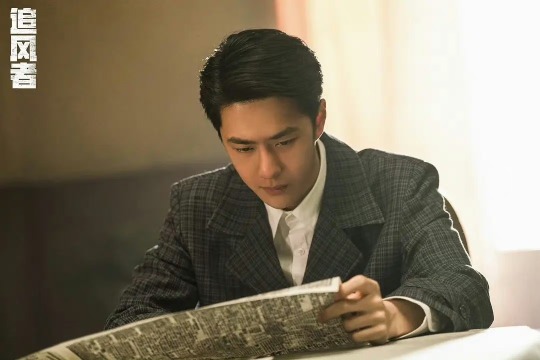
[Wang Yibo and Wei Ruolai run together] There are no extra tricks, no unusual paths, no blind spots, and everyone is on the big table. This is my overall evaluation of the popular drama "War of Faith". Of course, good dramas can always bring a lingering feeling of Wang Yibo and Wei Ruolai. I have praised it again and again but I always feel that it is not enough. In tonight's finale, let me praise Wang Yibo and Wei Ruolai once again.
Looking back at Wang Yibo's 38 episodes of "War of Faith", I found that he is "different again". Admittedly, being different is the norm for Wang Yibo. From Baili Hongyi, Chen Yu, Mr. Ye, Lei Yu, Chen Shuo to Wei Ruolai, the characters he chooses were never the same. This was a very strict high standard for himself. So, in the pedigree of characters he interpreted, Wei Ruolai was naturally unique and "different". Wang Yibo and the "different" Wei Ruolai, running in both directions, created a more "different" character for the audience. Although he was in the turbulent Republic of China, the fire of faith he held high had the ability to penetrate time. The ability to illuminate the present allows us to reflect on ourselves in the light - are we living as passionately as he is, and have we lost our original intention?
The director portrayed Wei Ruolai very well, and Wang Yibo made Wei Ruolai very real. From a young man on Qibao Street who only wanted a job when he got up, to a revolutionary who can command actions alone. how many knives are needed to carve this huge transformation? One can imagine Wang Yibo’s workload and hard work, and the most important thing is the character Wei Ruolai can only be carved with a knife, because he draws many lines and has a beautiful arc every time he turns, so that his crying is not the same as crying, and his laughter is not the same as laughing. In addition, in many difficult scenes such as being beaten, tortured, planning, executing, adjusting, etc., Wang Yibo was like an eight-armed Nezha who carefully carved Wei Ruolai's appearance. Of course, the clearer Wei Ruolai became, the more Wang Yibo's performance became visible. They were like two lotus flowers side by side. Like a mirror or a shadow.
After Wei Ruolai, Wang Yibo's performance will definitely be seen by more audiences; after Wang Yibo, Wei Ruolai will also be praised for a long time; they are really good, don't say goodbye, light and shadow follow ~
ps: Some people say that Wang Yibo won the lottery, no, this is what he deserves
#sharing for the last part! yeah! it’s not luck at all. this is what he deserves!#wang yibo#wei ruolai#war of faith#war of faith spoilers
46 notes
·
View notes
Text
Also just a stray thought.
"Character A would NEVER react this way" is such a weak kind of argument.
Character reactions are defined by the narrative.
IF you are writing a story, your character won't suddenly refuse to do what you wrote. You just need to convince your viewers that the character did what they would do.
What defines what character would or wouldn't do? It's not the "character".
It's essentially three things:
"Cause and Effect" - Cause And Effect is self-explanatory. What did you write your character as? What trajectory does the character have right now? Are they feeling hopeful because of their experiences? What kind of recent events are on their mind?
"Audience Expectations" - When you write a story, one of the main jobs of an author is to "guide" the audience toward an expected emotion, to make them wish for something - do you want them to REALLY hate a villain? do you want them to expect something dark and sad and tense? It's all about picking and choosing right building blocks.
"Intended Outcome" - You want your character to reach a specific endpoint of an arc. Your job is to arrange everything in between guided by that outcome you want to reach.
All of those things are in complete control of "The Writer".
Audience doesn't decide them. Characters don't decide them. You know what you want a character to do through the course of what you are writing and your job is to SHOW how the character arrives at the point that you want to TELL.
A writer builds an arc upon the building blocks that are there and then develops it according to the logic of the elements they have.
Some building blocks are less important because they are less related to the story arc and some are crucial because they tie directly to the character in question. So the writer needs to navigate which are which. "
You", the "writer", have the job to discern which are which.
Let's say you for example wrote a "lowest point" type of story moment where a character is emotionally and physically worn down by their experiences and reaches their breaking point. Your character has been through terrifying things, has experienced death and suffering and tragedy over and over and over again and is frustrated with their own inability to do anything or to change things, feeling hopeless and defeated and being forced to reflect upon their own life and choices. You made an entire pocket dimension of nonsense that was never ever mentioned before, JUST so you can do this story.
Now let's say there are multiple specific deaths that have severely impacted the character. That's what you the writer wrote to this point and why this whole character arc is even happening right now. Of course okay you just resurrected one of those dead characters for clicks so the audience would give you money for a while, but you decided to get rid of that character again (because again the character's purpose was just shock value). That's not something separate from the character arcs you are writing. It doesn't exist in a vacuum. You want to make specific things happen, but at the same time you have to wonder how and if the characters react to those things happening.
So now that character whose lowest point depression arc you are writing right now? One of their crucial life-defining deaths happened yet again. So you then start to think - "okay what do I do? How will this character react to having this important person torn from them a second time by someone they know and trust? What is the emotional reaction? Because there HAS to be one no matter the outcome because its a crucial building block of this character's arc."
Well, if you are canon RWBY writers you just go "MEH" and just pretend it all got resolved offscreen and not think about this pesky stuff, because turns out you don't want your character to go through the character arc you are making them to go through and are actively writing them going through? It's fine, you will just tell everyone the outcome of what you did not write months after you published it and downplay the importance of it and...Wait what.
That's it. That's the issue.
In this case The Character did not "refuse to react". They didn't do anything because their agency is the narrative agency.
In this case The Audience did not "refuse to accept what they saw". They did not impact how character reacts because they themselves just react.
In this case its The Writer who "refused to show the crucial element of the arc they are writing on-screen". You chose to not give the crucial character a reaction of ANY kind to a crucial moment.
Its not a failure of a character, or audience.
Its a failure of the one writing the story.
32 notes
·
View notes
Note
I admit I only tolerate Ray cause I love Khao. but irl I'd run from a guy like Ray and never look back 🫥
Hey Anon!
Thank you for talking about Ray, I'll take this opportunity to give my opinion on the subject.
I feel like a lot of people only tolerate Ray because it's Khao who's behind the character, so you're not alone! Your thought regarding real life is valid, don't let anyone tell you otherwise. It's essential to understand that choosing not to want to be with someone who has addictions doesn't automatically imply thinking that person is a bad person. A person's first instinct is always going to be to protect themselves and setting clear boundaries is a big step toward that. It's not necessarily related to dehumanizing the person with addictions, but to recognizing one's own limits and needs. After all, addictions are complex and can affect the dynamics of a relationship in a variety of ways. While it's important to offer compassion and support to those struggling with addiction, it's valid for others to choose not to expose themselves to situations that may be detrimental to their well-being.
Still, the dehumanization of people with addictions (whether real or fictitious) is a real issue and it's critical to remember that people struggling with addictions deserve compassion and support too.
In this context, Top and Cheum's scene helps us to reflect on the matter. Cheum refers to Ray as some kind of animal they can only hang out with if they have him under control. Without having it under control, Ray doesn't deserve to hang out with Mew?
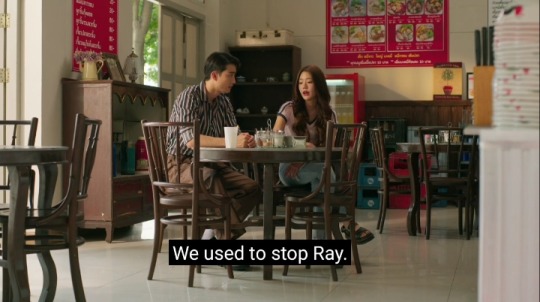
Personal responsibility: Understanding and supporting someone with addictions involves acknowledging the struggle, but not excusing actions that harm others. Seeking help and taking responsibility for one's own behavior is crucial.
However, it's essential that the audience understands the difference between understanding and supporting someone with addictions and excusing harmful behaviors.
Here are some tips to ponder whether we're excusing or supporting and understanding a person (real or fictional) with addictions.
Setting limits: Support involves fostering growth and positive change. If someone excuses harmful behaviors without the expectation of change, they are more likely to be crossing the line into the excuse.
Awareness of consequences: Understanding does not mean ignoring the consequences of actions. Those who excuse harmful behaviors can minimize the repercussions, while those who understand recognize the difficulties but do not underestimate the negative consequences.
Fostering growth: Supporting someone with addictions involves encouraging personal growth and looking for constructive ways to address challenges. Excusing harmful behaviors could involve passive acceptance of harmful actions without a clear drive toward improvement.

I'd like to add, much is said about how addictions affect Ray's personality but little is said about how trauma contributed to the origin of much of Ray's behavior patterns. In fact, many of Ray's behaviors (intensified by being intoxicated) are inherent to his personality. Ray's inclination toward violence, disregard for others' boundaries, possessiveness, desire to purchase affection, and stereotypical affluent behavior constitute his inherent traits. Even if Ray abstains from alcohol or drugs, these behaviors persist. Sobriety primarily enhances his capacity for reflection and attempting behavioral changes. The origin of Ray's behavioral patterns isn't in his substance dependencies but in his experienced traumas. His possessiveness, willingness for multiple relationships without preference and attraction to maternal figures like Mew or Sand stem from a deep fear of abandonment. In contrast, his violent tendencies trace back to the affectionless and hostile environment of his upbringing.
In conclusion, let's reflect and understand the way in which addictions affect Ray but let's not ignore that addictions aren't the cause of the problems but a way to cope with the inner real problems. In this regard, rehab can help treat addiction itself, but therapy is crucial to addressing the underlying roots of those behavior patterns. If the origin of behavior patterns is not addressed, unhealthy coping mechanisms may continue to emerge. Coping with and overcoming trauma, learning healthier coping strategies and changing those patterns takes time and ongoing effort.
#only friends the series#only friends series#only friends series ep 8#only friends#ofts#ray#khaotung#gmmtv#thai bl#only friends meta#ofts meta
25 notes
·
View notes
Text
Watching a YouTuber (Dan Murrell) review Oppenheimer and he made a great point about how movies are not content made to be consumed but art made to be digested. And I think that social media and the MCU has trained audiences to see everything as content which I think helps to explain some of the backlash that Oppenheimer has received which I don’t think it really deserves.
I think it’s valid and I’m not trying to speak over anyone who says that a Japanese voice should’ve been included or to show the people affected by the trinity test.
But at the same time, I think that speaks to how people consume movies as content instead of art. Because art is about perspective, not about telling the true or full story.
Oppenheimer was not a good guy. The US fucking sucks. The atomic bomb was not a good invention. And many people were victimized by it.
But, these are things people should already know. This movie isn’t about these things. It has a story to tell and it has emotions it wants to make the audience feel. Sometimes those emotions are to confuse or fill you with dread or suspense or joy or nostalgia — unlike content, the point is not always to convince you or inform you.
Oppenheimer is not about telling you if he was a good or bad guy. This movie is about making you feel the perspective of one man. And like the beauty of art, even though it’s not personal, it still feels universal.
Oppenheimer was a man who went back and forth on his convictions. Never truly seemed to believe them, but wanted the credit of believing them. He used left-leaning politics not so much because they were his own, but because he liked the women who had these politics.
And the movie clearly reflected that. It showed how he went back and forth. How there’s so many interpretations to who he was. How he might not even be that “brilliant” but that he was a good organizer and a good pawn.
Just as a side note this is a good thing to remember when neoliberals act like politicians can save us. I digress, but again that’s the point of art. Obviously, Nolan did not mean for this movie to reflect on neoliberal vs class-conscious politics, but I can take my experiences to interpret this movie and see how it reflects on my own world.
Also, I think this movie does speak to real life politics and power. The way that petty, vindictive men are making decisions about our lives without any care of the casualties. That so much of politics is a pissing match. That the government makes decisions, discards people, and hides it behind lack of information and propaganda.
Also, movies like any art, tell a story and make you feel emotions through methods that aren’t explicit. This movie uses perspective really well. Everything is told through the eyes of Oppenheimer. And we can quite literally sense and feel how the women in his life, his friends, the background people in Los Alamos, and the possible victims are not as important to him as his own personal dilemmas.
We see that through the use of color (everything in color is largely his perspective, and everything in black and white is outsider perspective), through imagery (when he sees water ripples on the map of possible locations), through acting (the script was written in first person, so Cillian Murphy’s acting reflects how this is purely Oppenheimer’s perspective), and sound (we feel the tension build up to the trinity test through the score because this is such an important moment to this character).
And by showing the people who were victimized explicitly, then you would be falsely showing that Oppenheimer and the US govt cared about these people.
In movies and art, there is just as much importance in what you don’t choose to show.
So, not to sound like an English teacher giving you a worksheet on a mandatory reading assignment, but art is meant to be interpreted.
What is the perspective? Is this narrator relatable? What devices is the author using to show these ideas? When this piece was published, what was the cultural and societal context like?
We shouldn’t treat art like a marvel movie or an infographic that’ll tell us everything we should feel. We should interpret it, criticize it, and analyze it for what it is.
Movies are met to make us feel. Even shitty movies. You can take as much a way from a Michael Bay Transformers movie as you can from Citizen Kane.
33 notes
·
View notes
Text
Black Sails and Facial Hair - Part 3, (Long) John Silver
One of the important aspects of character creation in Black Sails is that it proports to show not the Pirate Of Legend (a la POTC) but the Origin Of the Pirate Legend. But nothing can be created in a vacuum, you cannot reference pirate legend without engaging in some sort of historical storytelling that connects to the modern audience, which is, at its heart, the stuff of pirate legend. Narrative is an ouroboros, constantly eating its own tale.
John Silver shows up bright eyed and busy tailed and a perfect picture of a late 18th century sailor, down to the black shoes. His hair is a little too short, but reasonable and he’s rocking just a shade of a five o’clock shadow, but nothing untoward for a merchant ship in 1715. He’s a bag of snakes and like any good bag of snakes, he could get off in any port in the New or Old World and slip into the crowd without being noticed. He is, like Flint in 1704, perfectly suited to his surroundings. Flint’s crew take him at face value, but we know that this is a skin he wears that gives him more freedom than the bewhiskered pirates around him.

Throughout the first season, he stays pretty well shaved and clean. I mean, look at our boy after 5 days at sea and a shipwreck. This is the face of a man who plans to disappear into civilization as soon as he can. He even tells Flint, “I’ll find somewhere else to survive” - His appearance isn’t predicated on fitting in or telling a story, it’s predicated on survival. He’s handsome enough, but no one would look twice if they didn’t need to.
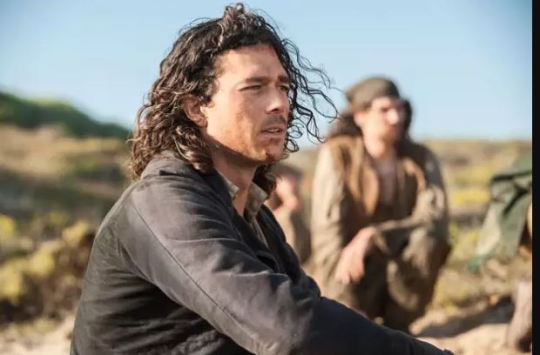
Unfortunately for Silver, everything he says comes true. And when he says “I don’t want to be a pirate”, well, I’ve got bad news for you snake man. He might say that out loud but his face tells a different story. After the capture of the galleon and his little Stomp Stomp routine, he stops shaving. It’s subtle at first. He’s still bright eye’d and bushy tailed (haired). But his hair is longer, his face is rougher. He’s starting to ingratiate himself with the crew, starting to become essential to Flint, starting to even find a place of belonging and in doing so, he drifts further from the safety of anonymity.

By the end of S2, he’s teetering on the edge. He’s got the mustache but compared to almost the entire crew, he’s still relatively respectable. However, look at how different it shows up in the light verses the dark. He might look like a citizen in the day, but at night his true self comes through and it’s all pirate.

Just as Flint’s door is closed at the end of s2, so is Silver’s. He can never again be an anonymous citizen, a snake in the grass. He might be able to integrate, but never again without notice. And he reflects that in his face. A full, patchy beard, very long hair barely brushed or contained - this is not a man who can step off a boat in any city and blend in. He’s clearly not taking care of himself.
Amputees are occasionally depicted in 18th century illustration - often in two distinct ways: The Good - employed and respectable (and clean-shaven) and The Poor - unemployed, whiskered, and dirty. Silver’s decided that since he can’t blend in, he might as well lean into the stereotype.

Additionally, there are instances of white men with beards living in the ‘civilized world’, particularly England and North America, but their lives are not easy. The beard is an essential feature of their Otherness, often Jewishness, and choosing to exist with that facial hair is a conscious statement. Whether as a statement of faith or as embracing his new condition, his beard is a clear rejection of reintegration or assimilation.
Contrast Silver’s unruly mop to Flint’s managed goatee, which he keeps neat and clean. The two of them, to an early 18th century observer, would make a terrifying pair, appearing as a mad Jacobean and a feral beggar, both ready to kill and not to be trusted under any circumstance. Quite literally the stuff of cultural nightmares and a sign of society unraveling.
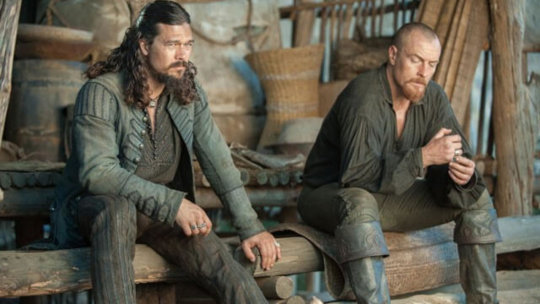
Madi’s presence helps a bit, as does his standing as Long John Silver in Nassau. His hair is more managed but the beard does not get any less wild. And he mostly stays this way through the rest of the show.
(a side note: the slick hair from the doldrums on is actually a factor of the production. Many outdoor scenes were filmed in the wind and to avoid Silver’s hair flying everywhere, it was slicked back, from Fathoms Deep)
By the time his in the forest, dealing himself his own emotional death knell, he is as uncontained as we see him. The beard and the hair are one, there is no pretense of return or control. He has become undone, he is scrambling to grasp at the last tendrils of his humanity.

Which makes his final scene all the more fascinating. Because the last we see of John Silver makes him look downright professional. He’s still rocking the beard, but it’s trimmed, his hair is in a neat tail, he is no longer wearing heavy layers, or even sagging his back all that much. He looks, for lack of a better word, civilized. Certainly far more civilized than we have any right to expect him to look after what we’ve seen.
He’s made his choice. He has chosen the safety of society over the wild uncertainty of war and resistance. He’s back, in essence, where he started. Able to walk into any port in the known world and be just another invalid, returning from war.

But the last year has done a number on him. He’ll never fully integrate. He hasn’t quite abandoned his pirate self (the beard remains), but he’s willing to work within the rules. He’ll never be fully in the system, but never fully out of it. He’ll always be on the shore, never on the sea or on land. He’ll always be a character archetype, never a full person. His existence is now essentially liminal, just as he wears a beard and a ponytail, a combination that is exceptionally odd for the period, but just perfect for our last view of the famed pirate king.
Part 1 - History of Beards
Part 2 - Captain Flint
#black sails#black sails meta#black sails history#long john silver#john silver#fashion history#ya'll had enough beard meta yet?#i think silver's facial hair journey is a trip#i lost my shit when i saw the last scene of him with a nice neat queue the first time#it's the clearest 'im trying to fit it' thing we see him do#and such a contrast to flint who's last scene is such a fuck you to civilization and rules of propriety#they become each other's mirror#this show is going to destroy me i stg#black sails beards
241 notes
·
View notes
Video
youtube
Castlevania Bloodlines Part 1: This is a vampire hunter on blast processing kids!
Yeah yeah I know, Rondo came out first but look: we only have 2 Classicvanias left before we switch over to Symphony of the Night, and since that game is Rondo’s direct sequel I think it’s more appropriate to do it last
Did you know that Bloodlines is one of the series’ worst selling games? Yeah it barely broke 50k units on release and while I think part of the reason was due to being a Genesis exclusive, with Castlevania never having built a fanbase on that system, I do think it’s also because, back then, people were losing interest
I mean what does Bloodlines really offer that hadn’t already been done in other games? We’re back to a 6 level structure like the original CV, we have only 2 playable characters and we can’t even switch between them mid-level, the controls are a step back when compared to 4 and the item crash moves are visibly nerfed when compared to Rondo
People often give flack to the Igavanias for being “Sotn clones” that shamelessly rehashed the formula, but, barring how that’s not really true, the same argument could be made for the Classics around this time
I mean after 4 all the following games went back to the previous control schemes and essentially tried to add some extra stuff on top of the standard formula. Rondo has alternate paths that lead to extra levels, but C3 had already done this, Rondo mostly just adds some extra steps. It has one extra character while C3 had 3 extras. Bloodlines, as I’ve stated, does very little new and Dracula X was essentially a watered down version of Rondo to many.
Indeed if you go see the sales for every game you’ll notice that they gradually dropped over the years, with Castlevania 1 selling over 2 million copies, Castlevania 3 only around 800k and so on. Of course it’s important to remember that sales do not equal quality, as there are many factors that play into a game’s sales, such as marketing. However I do think this denotes a certain decrease in interest by people in the games over the years, which is part of what motivated the devs to completely switch genres with SOTN, because they though people were no longer that interested in simple, short super tough platformers and preferred something new
Bloodlines may not be revolutionary but I firmly believe that a game does not need to be in order to be good. The game offers some of the most original and inventive level design of the classic games, especially due to its insistance for squeezing as much juice out of the Genesis’ systems to create truly surprising and memorable graphical imagery: just look at the water reflections in Atlantis, or the rotating sprites of the Tower of Pisa!
Of the two characters John is the Belmont stand in and my favorite: he doesn’t have a lot of reach but the whip still packs a punch and you can whip straight down and upwards diagonally. Important tip: hold down the attack button when attacking with either character, it will let the weapon stay on-screen for a few extra frames, allowing it to attack twice some enemies, trust me this can be important
I’m...not the biggest fan of John’s swinging mechanic, due to the stiff jump it can get really unruly but it’s only required like twice
As you may have noticed I’m actually playing the japanese version, titled Vampire Killer (real original guys). Why is that? Well not many people know this but Castlevania 3 was not the only game that was made artificially harder for american audiences!
Every version of Bloodlines allows you to choose between 3 difficulties, but the American version switches them around: US Normal Mode is actually JPN Hard Mode, while Easy is actually the Japanese Normal. The US version also locks the full ending behind its own version of Hard mode made specifically for this version, while the japanese version gives you the complete ending no matter what difficulty you’re playing on
Then there’s the matter of continues: this game, unlike the others, gives you only 2 continues after which it’s game over for good. All versions have a password system but in the US version a password is given to you after you beat each level and it saves the amount of lives and continues you have. This means that if you’re at the final levels and have no continues left and few lives you’re shit out of luck
In the japanese version however passwords are given to you only when you get a gameover and after inputting them your number of continues is reset. This means that in the japanese version you actually do have unlimited continues, just in a more roundabaout way. Also continues in this game respawn you at the last checkpoint, so thanks!
All of these difficulty differences are also true for the european version I think, which follows the japanese one but is heavily bogged down by graphical censorship because Bloodlines likes to get a little gory and I guess people back then must’ve been afraid that one too many moms in Europe would’ve been upset at the idea of little Timmy busting some zombie guts while playing his kiddie game
7 notes
·
View notes
Note
I've a bit of a vague question: How do you decide how much detail to go into when it comes to formative traumas for your characters, and particularly past sexual traumas and similarly loaded topics? I don't mind highly detailed, dramatic pasts (à la Doctrine of Labyrinths), though I know some people find overwhelmingly dark pasts trite and difficult to engage with ("grimdark" or "misery porn" - not terms I agree with), but in my own writing I tend to imply rather than state past horrors. 1/2
2/2 It's difficult to find the balance; obviously leaving too many things unsaid renders the story vague and not very compelling, whereas being too detailed alienates readers too. Of course there's ways to explore trauma which don't feel gratuitous or exploitative, but I think there's a knee-jerk impulse to dismiss certain media for the blatancy of their content alone regardless of how that's handled in-universe. How do you navigate this and settle on content which feels right for your stories?
*
Hi anon!
At first when I was thinking of how to reply to this, all I had was 'I just do it, it feels natural.' Which is true! It does feel natural. But that's not helpful. So I've been noodling on it more and I think I finally have a twofold answer.
Firstly, I don't care about what the reader thinks re: how graphic I get about retelling a character's past or trauma, because a) my content is thoroughly warned for and b) I tend to place additional warnings in 'extra confrontational' chapters. After that it's not my responsibility or my business.
But I do know as someone who has been through extensive trauma, I would've like, sacrificed a theoretical firstborn to read stories that were as detailed and thorough as mine re: trauma recovery and trauma representation. I'm not writing for people who don't have trauma in their backgrounds (must be nice, can't relate), not to sound callous, but they're not my target audience and I don't care if they're too fragile to handle what's going on. They get the warnings. I write for the people who need to see their traumatic histories reflected in fiction. Because that's what I needed.
Okay, so, point the second. How to know how much detail to go into?
The character. I follow the character always. It's important to know enough about post-trauma and behavioural changes and what happens to the mind, as well as a character's general disposition, to know where you're going in terms of detail. That, anon, is something you're going to have to research.
Felix in The Beast that Chose Its Own Bridle is more 'graphic' in his thoughts because he doesn't have the same kind of post-trauma as many other characters I'm writing. He has it, but it manifests in how he communicates and attaches to people, but he has no problems reflecting on or recollecting certain experiences (while avoiding thinking about others). This is fairly consistent with the character in the canon. He's also known for weaponising or talking about graphic experiences for shock value, or to push people away. So he will choose deliberately confrontational methods of talking about his life.
Efnisien on the other hand in say Underline the Black doesn't believe he's been through trauma and his brain is very protective as a result. People with extremely protective minds aren't likely to have graphic recollections of trauma on a regular basis, or are more likely to have nightmares (which he has), or have profound behavioural changes (which he has) which are consistent with trauma. I expect Efnisien's memories will get more explicit as the story goes on. We can see his 'shying away from the graphic nature of upcoming trauma' in the medical exam, he is actively trying to dissociate. A character that dissociates will not constantly be reflecting on trauma, but they might be shocked by it in the form of visceral flashbacks or nightmares. They are more likely to show overall behavioural changes.
Efnisien in Falling Falling Stars had intrusive thoughts as a manifestation of his trauma, and as those intrusive thoughts were dealt with and Efnisien acknowledged he had trauma, he began to have more graphic flashbacks. The more he acknowledged the content in the flashbacks as being traumatic, the less he actually had to deal with a ton of graphic stuff being described, because he was slowly recovering.
Augus in the canon rarely reflects on any of his past trauma. We see it less than a handful of times in any graphic memories, over 1.5 million words. But he has some behavioural changes around trauma. When he experiences current trauma in the story, it's often emotional, and he usually responds with anger or a fight response (and sometimes a flight response). So I would say Augus' story and descriptions are overall less graphic, which fits his disposition, which is to heavily compartmentalise his pain, so he doesn't have to deal with it (which comes back to bite him later on).
So basically if a character is leaving things vague, it's because they can't handle it yet, and that's normally because of dissociation. I've definitely written characters who have dissociated through current trauma, and who are trying to avoid past trauma. Likewise, there are characters who are just starting to experience flashbacks, and characters who are so 'oh yeah I was a child prostitute, what of it?' (hi Felix), and it all comes down to just...where they're at in their journey. How healed is your character? What do they still have left to deal with? What are their main triggers? What do they see or experience in their mind or their body when they're triggered? Have they been through so much trauma, they no longer really respond to new traumas properly? (See Augus and Efnisien, lol). Or are they very unfamiliar with trauma? (See Eran). All of this changes how a character will think about trauma. If a character is super good at compartmentalising for example, even if they go through a current trauma, I'm not likely to write it in huge detail. But if they're bad at it, or flooded, I will.
When applying this to your own writing, think about your characters and their natures. Are they the type to mentally run and hide from trauma? Those characters might not be describing it mentally in great detail unless they're forced to because of a flashback. Or are they characters who don't find something that traumatic? Then you don't need to describe what's happening in as much detail. Are they very sensitive people? Then they might be noticing every detail, or they might be noticing one or two details and trying to forget the rest in order to survive. The nature of your characters, their previous experiences, their coping skills with trauma, for me, all determine how graphic you need to be.
Tl;dr none of my decisions are determined by the reader, because I don't care about the kinds of readers who will go 'this kind of trauma is gratuitous/exploitative' or whatever (and I'm sure some have). I have PTSD, therefore, I write post-trauma. Not everyone with PTSD can handle my content, that's why there's warnings. But for the people who can? Who need it because of their own histories? Who just want to a) feel seen, and then b) feel like healing might be possible? I see you. You're the ones I'm writing for.
Also, for the record, grimdark refers to no characters being likeable or trustworthy and generally terrible things happening all the time, including at the end. It assumes an untrustworthy and dark or corrupt world, and therefore dark or corrupt characters. It actually in and of itself has nothing to do with 'being super graphic about trauma' (though they do often go hand in hand). Most of my stuff could never be grimdark, no matter how graphic it gets, because there's always a lot of hope, healing, and the assumption that the majority of the world is capable of good despite great evil. As for misery porn, sure! But I don't care, see point 1, lol.
I definitely think researching trauma and researching case studies about how people write about their own traumatic experience can help. A lot of the time people who have PTSD aren't actually thinking about their experiences in graphic detail because avoidance is a symptom of PTSD, which means their/our behaviours have changed to avoid thinking about those things. My entire life has been marked with trauma, but I don't talk to anyone about it or think about it often, because avoidance is a cardinal symptom of PTSD/C-PTSD. So if I were writing my story, it would be very not graphic, with bursts of intense graphic detail that even I don't like experiencing.
Conveniently in storytelling, this means even if you are sharing graphic trauma, it's very selectively, and not all the time anyway. Because 'all the time' it's not how human brains work in the first place. So once you understand more about the mechanisms of trauma, trauma avoidance, post-trauma , and trauma recovery (where sometimes some of the most graphic reflection happens, but often in a more supported environment, so it can feel gentler to the reader), you get a better sense of how graphic to be, and how often! So I'd say this will be down to a) researching trauma and b) reflecting on the nature of your characters!
I hope that helps!
#asks and answers#pia on trauma#pia on writing#ptsd and cptsd#how graphic to get#ptsd#post trauma#writing and trauma#writing and ptsd#writing and cptsd#tumblr got weird about posting this ask#so i've had to make it into a new post#and rebuild it all salkfjasfsa#this seems like it will work now
42 notes
·
View notes
Text
Listen, I know this might sound untrue, but Arthur IS mostly a bad dude—or at least not as good a man as some claim. (I love him still but hear me out)
This is not me arguing “he’s bad so you shouldn’t like/glorify him” at all, I promise—I can’t stand that rhetoric. It’s just that I see a lot of “he’s so kind” “so good at heart” “so hard on himself” and I wonder why folks so often adamantly, un-ironically claim him as a misunderstood gentle giant type.
The fact that he’s mostly nice to those he cares about and is willing to help strangers in need (never mind both of those things are optional anyhow, you can just as easily play him as an asshole who doesn’t come to anyone’s aid—) doesn’t undo the harm he’s responsible for throughout the game. Nor does him being told to do so by an authority or being a victim of circumstance undo it.
His good doesn’t make up for his bad, and I don’t think it actually needs to. His bad certainly doesn’t take away from what makes him compelling and likeable to the audience; but within the context of his world, he’s right to be unhappy with who he is. It’s not a matter of low self esteem or self worth issues, his unhappiness with himself comes from self awareness.
(Saying this with a grain of salt because you know, fictional character with no real agency whose actions are as such for plot reasons), he may have had a shit hand dealt to him, but he’s a person who makes bad choices. He’s charming and relatable (and hot lol) but I’m not sure I understand the whole simplifying his character to “good person stuck in bad situation” thing, when it plainly isn’t the case, no matter how much we like him.
I think the “you’re a good man Arthur” line gets thrown around as proof of him being good at heart; but I think it’s more like, he needed to hear it to act as such. He needed to be told how to be good and pushed into reflection and immediate actions. He needed to be told that he’s a good man by others because he needed permission in a sense to be different than he knows himself to be. (Take a shot every-time I say good)
“The Thomas Downes mission was out of character” it really isn’t. He says what kind of man he is multiple times, he hammers the point home that he’s a bad man. And while there is definitely a bit of self loathing in that sentiment, he’s still speaking his truth. He’s just unhappy with it; he IS the type of man to commit an atrocity like beating a dying man for a few bucks. It goes against the beliefs fans have projected onto him, usually coming from their own moral compass instead of what the character shows his own to be, and that’s why it ‘feels so wrong’ to see him doing something actually despicable.
We arrive at this misunderstanding due to fandom projection, as well as this rampant desire to problem solve by ‘fixing’ the canon material to fit a sort of agenda. Ie, ‘I only like the good attributes in this character’ ‘it’s only acceptable to like this bad dude provided he’s always feeling guilt for his actions’ or ‘he’s not really at fault for them.’
But the thing is, even if Arthur is at conflict with his actions, the guilt he may feel isn’t an indication of anything pure within him. He’s in total control and chooses still to go along with everything. I tend to think an action done in guilt is functionally the same as an action done with enjoyment. Arthur feeling bad at the end of the game for his faults and complicity doesn’t mean he is good. Nor does it mean he ‘was a good the whole time’, nor does it excuse what he’s done.
We don’t have to make him a better person than he is in order to like him, is what I’m trying to say I guess. It’s fine to acknowledge all parts of him, to do otherwise does a disservice to his character as it often flattens them beyond recognition. And it’s also fine to hone in on what you appreciate most and write and draw and celebrate that while functionally ignoring the rest if you so choose—but it’s also fine (and usually important) to acknowledge who the character is without the plethora of projections placed upon them.
Arthur ends the game with a loving act, more or less saving John, saving Abigail, Tilly, paving the way for them to become something better than he was. None of these things are meant to be a great action done to save his soul or redeem him in any eyes, especially not his own. He dies on a good note (and yeah I would say low honour/back for the money is still a ‘good’ choice for a low honour story), and shifts his focus to the last good deed he’s done in his final moment as a way to leave off peacefully despite all his wrongdoings. He doesn’t get redemption really, and he doesn't wholly achieve 'goodness', despite all the potential for growth the audience can see in him, that’s the deliberate tragedy of it all.
#i know im forgetting so many things that would change the tone of what im saying so take away is this; i love him and i love ooc him#but flattening the character and reducing them to their best or worst traits alone is a type of simplification im thinking we should all#grow out of#boy that was a doozy#sorry if that got nonsensical#I usually skip analyses stuff or essays and commentaries but this was rattling in my brain for a while#not to be negative but one of the worst parts of fandom to me is when a character/story gets lost in translation due to fanon#and I think that’s rampant here especially and not just for arthur#but what do I know yk#NOT a character critical post I love him he’s my wife and son in one too precious for this world yadda yadda#arthur morgan#rdr2#red dead redemption 2
14 notes
·
View notes
Text
My fill for @flashfictionfridayofficial prompt #233 — imperfect sign (and a fandom I never though I'd write for!)
Fandom: La que se avecina (Spanish TV Show)
Rating: Teen And Up Audiences
Pairing: Yolanda Morcillo/Óscar Serra
Tags: Missing Scene, Character Study, Marriage Proposal, Implied canon cheating
Summary: Yoli reflects on if she should marry Óscar just because she likes the proposal ring.
Wordcount: 300
Also created for @multifandom-flash, round 3 card #2001 — Tough Love

Yoli thinks that in the history of the world people have gotten married for less than a nice ring.
The nice ring on her left hand, to be fair, is also a cute one. Three thousand euros on the web when Lola made a search.
To her surprise, Lola hasn’t said anything yet. Yoli moved in with her with the agreement to keep it a ‘singles’ place’. No relationships and no attachments. Dudes around only with an hour warning. That’s why she chose to be ‘the someone else’ for Óscar, a neighbour with his own bed nearby.
So once she’s said ‘yes’ to the guy that had kneeled at their door first thing in the morning, Yoli expects Lola to say something. Then she thinks the actress is just living for the narrative and the drama within the situation.
Will Yoli marry him? She definitely wants to design her wedding dress. Does she want to marry him? That would kill all the fun of messing around with him. Giving her mom some good news? Yoli isn’t really up to that, now that they’re fed up with each other. And what about Óscar’s girlfriend? The poor girl is going to be heartbroken when she finds out her prince charming has proposed to the girl next door. To the ‘someone else’, because Yoli insisted on keeping their relationship that way.
The most important question, the only relevant one, is if Yoli is in love with Óscar. Or if, at least, she likes him. That’d way, she’d have a better reason to marry him other than him choosing a decent ring.
Yoli’s asking him to come and telling him she doesn’t think the wedding is a good idea.
That, on a comedy show, would give them at least two episodes more of plot.
5 notes
·
View notes
Text
SxF interview & panel discussion at TICA
I was reading articles about Kyōji Asano (animation director) and Tetsuya Nakatake (producer) attending the Taipei International Comic and Anime International, so I’ve decided to share some of the interesting things I’ve read here.
In the YouTube live video,
11:10
Nakatake gestured how tiny Anya would be in real life. Asano then gave a quick demonstration on “how to pick up baby Anya and carry her on your shoulder”. I thought that was really cute. As if they all know Anya so well they are ready to babysit her at any second.
12:47
Asano drew a bunch of Anya’s faces. From 12:55 onwards he just started pointing at the faces he drew, and said he enjoyed drawing them very much.
15:54
Nakatake jokingly said they (I’m guessing he meant Nakatake himself, Asano and other staff members who also have children) could particularly relate to tired™ Twilight. They have children and understand how exhausting being a parent could be.
There are also displays of pictures of character designs and frames sketches. You can see they are particularly proud of the original designs and scenes they’ve created for the show.
No recording is allowed during the panel discussion. I’ve read several articles (Source 1, 2, 3) and a post by an attendee, and what they’ve shared are more or less the same:
1. They spent a month creating the second ED. They’d actually cooked all the food and presented them on a table so they could draw it. (Source three actually provides many interesting photographs of the food and the sketches hey’ve drawn while producing ED2.) It's such hard work, so much so for a 10-second scene the team had created 100-130 frames, and a member of the team even said he’s gonna quit, but they’d all persisted. Asano said their goal was to make the audience hungry while watching ED2, and was particularly happy to hear from the attendees that they have succeeded.
2. They had also drawn the food Yor made before pixelating it. And no, the team won’t show us what they originally look like. The team likes the scene where Yuri ate and threw up at the same time so much the animator put in extra effort to draw it. (Nakatake: Don’t you like sick characters like Yuri?)
3. The work atmosphere while creating AoT was more stern. On the other hand, it feels more lively when producing SxF. The work atmosphere is usually affected by the content they are creating. The animators have their own ideas they want to express as well, and it is a lucky coincidence when they get to animate a popular work they happen to be interested in, and the audience likes the product as well. They feel the bliss while creating the anime, and hope to create something the whole family can enjoy.
4. They create the OPs and EDs as something to add to the world-building. OPs and EDs also offer an opportunity for the team to show the audience their own interpretation of/ reflections on the story. They went on to explain how OPs and EDs are usually done. Most of the time they would have the song first. The musician would read the manga and write the song. The production team would then design the scenes that would match the song. The director confirms what scenes would be needed, and the animation team proceeds to create the OP/ED.
5. It is of utmost importance to make Anya cute. Asano suggested to draw her hair first, then the shape of her face. Draw her facial features last.
6. When asked of their favourite scenes, Nakatake said the interview scene where Loid punched the table was what inspired him to push the sxf animation project forward. Asano liked ep 5. He thought it made the story livelier.
7. Nakatake likes Yor the best. He says he wants to meet her in real life, and claims he doesn’t mind eating her food. (He also likes the scene where Bond ate the cookies Yor made and fainted.) Asano wants a daughter like Becky. If he had to choose between Anya and Becky, he would still choose Becky.
PS I've also shared an identical article here. I did the translation myself. I didn't translate everything. For example, Asano also mentioned AoT as another example of how they do original scenes. Anyway, I hope you enjoy reading this.
51 notes
·
View notes
Text
Buffy the Vampire Slayer: Never Kill a Boy on the First Date, S01E05
I’ve always enjoyed this episode; it’s an important one in the Story Arc, but it also grapples with the whole superhero-esque “double life” drama that Buffy has to deal with.
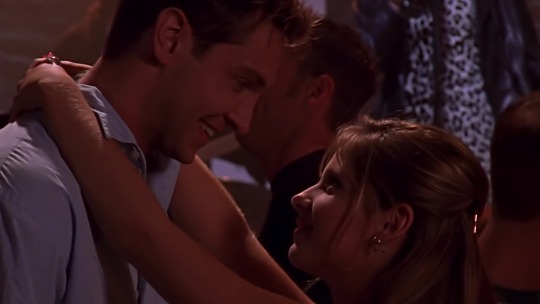
It kicks off in a cemetery, in which Giles monitors Buffy’s slaying of what seems like a random vampire, but one that leaves a ring behind. This is not something that happens very often (or perhaps, ever again...?) since usually all garments and jewellery on a vampire turn to dust along with the vampire itself. But today it’s an important plot-point, so we’re going with it!
The ring has three stars and a sun on it (which Buffy finds familiar, how...?) and Giles identifies it as belonging to a vampire sect known as the Order of Aurelius.

Meanwhile, the Master is reading a prophecy from a book down in his underground prison. As an aside, I LOVE prophecies and all their permeations: Self-Fulfilling Prophecies, Self-Defeating Prophecies, Prophecy Pile-Ups, Twist Prophecies, Twisting the Prophecies, Either/Or Prophecies... if there’s a prophecy, I’m ready to find out how it’s going to trick the audience and mess up the characters’ lives.
So here’s this one: “And there will be a time of crisis, of worlds hanging in the balance. And in this time shall come the Anointed, the Master's great warrior. And the Slayer will not know him, will not stop him, and he will lead her into Hell.' As it is written, so shall it be. Five will die, and from their ashes the Anointed shall rise. The Brethren of Aurelius shall greet him and usher him to his immortal destiny. As it is written, so shall it be.”

Okay, I have some questions. And if you’re going to be reading these reviews, you need to know that I delve insanely deep into bits of world-building that absolutely none of these writers gave a moment’s thought about beyond using them to crack the story into gear.
First of all, who or what was Aurelius? A vampire prophet? And this sect of his is essentially all of the Master’s followers? Who are committed to standard doomsday shenanigans? And who wrote this prophesy? I’m assuming Aurelius himself. Somehow the Master and Giles both have copies of his work, though the latter is without some crucial pieces of information – namely that the five prophesied to die won’t just happen, but be specifically targeted by members of the Order.
Which is why Buffy and Giles are left sitting in a cemetery, waiting for the Anointed One to rise from a grave, instead of realizing that the brethren have to make the Chosen One they’ve been waiting for.

But then, how did the Master know that he had to deliberately seek out the Anointed One and self-direct the circumstances required to bring about his rise? How’d they know how many people were in the van? Was the little boy deliberately targeted, or could the Anointed One have been anyone on the bus? When a person becomes a vampire they’re infected by a demon soul, so did the Anointed One choose the vessel he was going to be reborn in? In which case, did he deliberately pick the body that the Slayer was likely to overlook?
Because I dig the idea that the vampires turned Andrew Borba as a deliberate red herring, tricking the Slayer into believing he was the Anointed One while they spirited the real one away.
(For the record, I don’t actually expect any answers to these questions, I just like pondering them. If you find it annoying, then definitely don’t read any more of these reviews, because I LOVE doing this).
The other plot that’s going on during all this is that Buffy is approached by Owen Thurman, a guy we’ve never seen or heard of before, but who she’s apparently had her eye on for a while. It was early days of the show – just go with it.

Owen seems to get a lot of flak from fandom, but I think he’s a fairly decent guy, which reflects well on Buffy. This could have easily been an episode about her crushing on an unworthy jock character who proves himself to be a complete coward after that run-in with the vamps at the funeral home, but the story is more bittersweet if he’s not just a cute cardboard cut-out that Buffy can project her desire for normality on.
That Owen is more than that is a credit to Buffy herself, and it’s interesting to see what she finds attractive in a guy: intellectualism, sensitivity, perceptivity... Later on, Willow describes him as “solitary, mysterious, broody” which is hilarious – because who else does that describe? Buffy is an intelligent and observant person, but she’s definitely not a scholar or a poet, so that she finds that appealing in a potential partner reveals a well of romanticism beneath her pragmatism. (Yeah, she was never going to be able to resist Angel, was she).
In a gag I wish they’d used more, Owen comes into the library looking for a book, and Giles is initially baffled that the library can be used for more than just a Slayer/Watcher homebase. In fairness to him, this is the first time any character has walked into this place who isn’t Buffy, Xander, Willow or himself. I was kinda disconcerted as well.
Owen invites Buffy to the Bronze that evening, which sets up our internal conflict for the episode: Duty to the World versus Longing for a Normal Life. Giles also throws in the added issue of “if you tell anyone else about your true identity, you’ll make them a target and endanger their lives” which is kind of funny because neither he nor Buffy factor Willow and Xander into this equation. Seriously, Giles has no worries about either of them whatsoever.
Buffy makes it late to the Bronze due to aforementioned Slayer duties, and spots Owen dancing with Cordelia, who is all over him. Buffy leaves in a funk, and – come on, girl – you didn’t need binoculars to notice that Owen looked very uncomfortable.

That night, a van full of exactly five people (the driver, a mother and son, another passenger, and a guy called Andrew Borba) is attacked by a gang of vampires. It’s a pretty unsettling scene, and Borba throws up a lot of questions. Obviously, his purpose in this episode is to serve as a red herring to the Anointed One’s real identity, but you can’t really blame the Scoobies for targeting him. He’s physically intimidating and even before his turn he’s ranting fire-and-brimstone nonsense about the end of the world.


When Giles brings the news to Buffy, showing her a newspaper that reports five died in a van accident and one of them was wanted for questioning by the police regarding a double-murder, it once again coincides with Buffy attempting to go on a date with Owen. Hilariously, Giles tells her all this at her house, just when Owen turns up to collect her for their date, and Buffy has to hastily cover for his presence by promising to bring back her overdue library books.
Also, Willow and Xander are there. Also also, Joyce is not there, which is kind of weird. Where is she while all these people are having an extended semi-argument at her front door at night?
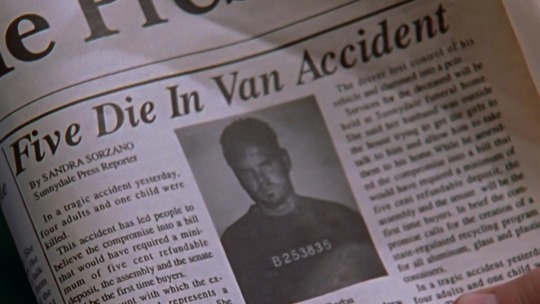
If your eyes are good enough to read this text, you'll discover it's amusingly incoherent. Five cent refundable deposit? Huh?
Owen and Buffy head to the Bronze, Giles decides to investigate the funeral home by himself, and Willow and Xander are torn on who to follow – naturally Xander wants to sabotage Buffy’s date, while Willow is worried about Giles.
Buffy is enjoying her date with Owen, but who should turn up at the Bronze but Angel, who essentially scolds her for not being out on the streets, doing her job as a Slayer. (As he informs a bewildered Owen, he and Buffy know each other from work). It’s his one scene in this episode, so he has to make the most of it – and it’s probably a good thing Angel is now aware Buffy isn’t just sitting around by herself daydreaming about him.
Giles makes it to the funeral home and in a cool shot, the camera pans from him to the ominous sight of the cemetery across the road, then back to him with a vampire standing right beside him. Followed quickly by another one behind him. He makes a dash for the doors of the funeral home, but unfortunately this isn’t a place of residence, and the vampires can follow him inside.

Like I said earlier, my head-canon is that the reason they don’t just kill him is because they’re here to collect the real Anointed One, and want the Slayer and her Watcher distracted from that objective.
Giles manages to barricade himself in the morgue, and it never fails to crack me up when Xander and Willow give him the fright of his life when they appear at the barred window. Apparently Willow won that argument, and the two of them head off to fetch Buffy. Giles is left trapped in what is a genuinely fraught situation. At any point the vamps could break into the room and finish him off.

Xander and Willow crash Buffy’s date and float the possibility of everyone heading for the funeral home (Willow: “I’ve always wanted to go THERE.”) Owen is surprisingly up for it, but Buffy manages to extricate herself... though not before doubling back and kissing him, right in front of Angel. Her first on-screen kiss – congratulations, Owen!
(Also, is there a reason Angel doesn’t accompany Buffy to the funeral home? I suppose he hasn’t really gotten involved in any physical altercations so far, and there’s a chance the writers still don’t know he’s actually a vampire, but if that’s the case then his reaction to Buffy’s “bite me!” comment is up there with his “I’ll be damned” one in the pilot in terms of unintentional irony.
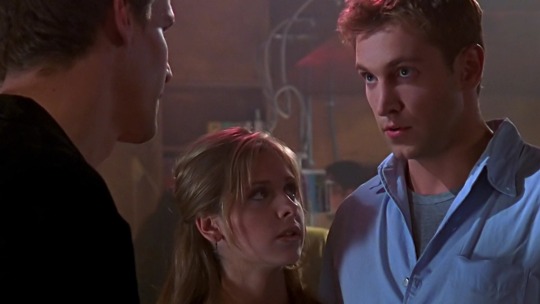
But I feel that the name “Angel” was chosen for this character as a nod to being someone’s guardian angel, as opposed to the irony of it being applied to a vampire – which as I’ve said, the writers’ room didn’t know yet – in which case, he should be doing some more overt guarding).
Owen tags along to the funeral home anyway, and you can almost hear the Benny Hill music as the gang duck in and out of rooms and down corridors, with Buffy desperately trying to keep her date out of danger and in the dark. She finally manages to corral him into an office while Xander and Willow barricade the door (which hilariously includes a lampshade) only for Owen to notice that they’re in a viewing room, and the dead body on the other side of the glass is moving. The safe room is the opposite of safe.

Buffy finds Giles hiding with a cadaver in a body drawer in the morgue, and it’s almost funny how utterly clueless Giles is about what’s actually going on: “I don't know what these brethren mean to do exactly. Find the Anointed, or, or, or, or give him something perhaps, uh, it's all, all very vague! And the Anointed may be long gone!” Honestly, the vampires kinda deserve to win this one.

Buffy rushes back to the others when she hears the newly-risen Andrew Borba smash the glass between the two rooms (there is some top-tier comedy going on in the background as Willow and Xander immediately start unbarricading the door again) and Owen gets his first eyeful of a vampire.
There’s some running and fighting – which includes Buffy doing a completely pointless backflip off the top of a gurney – but ultimately everyone ends up back in the morgue, where the fires in the crematory accidentally get turned on in the scuffle. Owen attempts to come to Buffy’s aid, only for Borba to smash a body-drawer door into the back of his head, knocking him out.
Thinking he’s dead, Buffy is galvanized into fighting Borba with full Slayer-strength, and eventually manages to throw him onto a gurney, using his momentum to slide him straight into the crematory chamber. Owen comes to, but much to Buffy’s disappointment, decides not to continue their date. Willow and Xander offer to get him home safely. (Aren’t the rest of the vampires still outside? Or did they just grab the Anointed One and hustle?)

But there’s a couple more surprises on the table: the next day at school, Owen approaches Buffy and wants to give it another go! Turns out he loved the danger and excitement of their time together, and is looking forward to more adventures with her. Realizing that this attitude will only get him killed, Buffy commits her first act of noble sacrifice and breaks off their budding relationship.
Giles tries to console her with the story about when his father informed him it was his destiny to become a Watcher, like his father and (interestingly) his grandmother before him. Um... can we learn more about Giles’s grandmother the Watcher? Because that sounds super-interesting.
But it’s cold comfort for Buffy, who only cheers up a little when Giles points out that at least she killed the Anointed One – which is of course, our cue to cut straight to the underground church where the Master is welcoming the very not-dead (undead, in fact) Anointed One into the ranks of his brethren... and it’s the little boy. Dun, dun, DUUUUUN.

Every superhero must sooner or later grapple with the fact that their loved ones are in constant danger if their proximity to super-heroics were to ever be discovered, and this was Buffy’s episode to go through that particular learning curve. It showcases her early frustration with the double life she has to lead, and in seasons to come, it doesn’t get any better – not when it comes to her dating life, her continuing education, or her career opportunities. In the last three or so seasons, she has no life outside fighting evil at all.
Which is why this early interaction with Owen is so interesting. He’s a little condescending to her at times (like when he gives her his watch and points out where the big and little hands are) but it makes a kind-of sense that the otherwise utterly self-sufficient Buffy would respond to something like this. She’s been designated as the tough, weird one by her peers, and this kind of baby-talk flirting probably takes her back to her pre-Slayer days, when she was just a normal (perhaps somewhat vapid) teenage girl.
And I like that Owen is a worthy crush for her to have. Sure he’s a little pretentious, but he’s also completely sincere about what he’s into, puts his foot down when Cordelia keeps trying to interrupt their date, and is brave enough to double-back into the funeral home when he thinks Buffy is in trouble, even decking Borba with a metal tray in her defence. He’s perceptive enough to describe Buffy as being like “two people”, and I think Buffy responds to that – the fact he’s not so clueless that he can’t observe there’s something different about her (and is attracted to her because of that). Heck, he was practically a baby version of Angel. In another life, they would have been good together.
But there were always some cracks in the potentiality of the relationship, from his off-handed comment in the Bronze (“there’s a lot more important stuff than dating”)* to the way he freaks out after getting knocked unconscious at the morgue.
* Buffy has a visible reaction to this, because dating IS important to her as it represents her shot at a normal life. That he’s dismissive of it is ironically reminding her that she’s shirking her duties
I give the writers infinite credit for not taking the easy option and giving him Easy Amnesia after this bonk on the head, as well as avoiding the “it’s all too much for him” cliché. Turns out he’s up for more danger with Buffy... but that only means that she has to be the one to end it for his own safety. She’s just learned the hard way that ignoring her calling puts people like Giles in danger, and (as the audience already knows) she was so distracted by his presence at the morgue that she failed to destroy the real Anointed One.
Avoiding her responsibilities can cost others their lives, and she’s more resigned to her fate than she was at the episode’s beginning. (Which means it’s also beautiful setup for the show’s very last episode. We’ll get there).
Owen could have been a halfway decent member of the Scoobies, but in the end he doesn’t realize that none of what Buffy does is for thrills or fun. The “dating life” that he dismissed is a luxury he’s lucky to have. Real depth is doing what’s required of you, not going out looking for trouble.
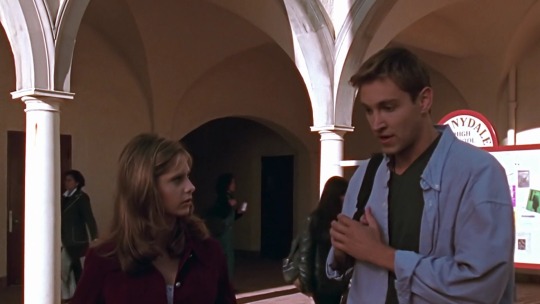
So Buffy pulls the “let’s be friends” speech and Owen walks off and out of the show forever. Still, I head-canon him as a guy who is eventually part of the school committee that rewards Buffy with her “Class Protector” award at the prom. Think about it: he got close to Buffy, he saw some weird shit that night, he probably went on to share some stories with the other students... I like to think he figured out some of what was going on and pitched the idea (or at least helped with the presentation) of that umbrella award.
See also: Xander loudly mentions slaying in the school cafeteria and no one cares. In hindsight, this episode neatly encapsulates the idea that people will brush off weird comments and/or occurrences... but like Owen, might well be paying more attention than we the viewers initially give them credit for.
Miscellaneous Observations:
Things get so much more complicated and harrowing with the bad guys later, so in these early days it’s actually rather refreshing to see Buffy just take on some old-school vampires who just want to eat people.
This is one of the rare times in which a vampire leaves behind an article of clothing (or technically, a ring) even though this is something that logically should be happening all the time. I mean, why are jackets and pants and t-shirts turning into dust along with vampire flesh? Obviously, the answer is “budgetary reasons,” though it would have made more sense (and been kinda cool) if a vampire’s clothes were left behind when they were dusted.
In fact, my next-tier head-canon is that on being staked, vamps revert back to whatever stage of decomposition their corpses would have been at if they hadn’t been turned – so the older ones would burst into dust, but the newborns would leave a body to be deposed of. (Again, I can see why the show didn’t go with this).
On the subject of prophesies, the Anointed One is referred to as “a great warrior” and “a mighty ally” and “the greatest weapon against the Slayer”, which... is really not the case in the end. They get the “five will die” and “the Slayer will not know him” bits right, but he’s definitely not a great warrior and ultimately doesn’t even “lead [the Slayer] into hell”, unless that’s just a fancy way of describing “an underground church.” Having him be a child was a good twist, but all things considered, he’s way overhyped.
The show’s other important One-Shot Character was Andrew Borba, who leaves behind some lingering questions. For instance, was he really responsible for that double murder? Who did he kill and why? We’ll never know, but the reason I bring it up is because if it’s true, this guy was more deadly as a human than as a vampire.
He also had some interesting things to say once he’s arisen as a vampire, such as: “He is risen in me! He fills my head with song!” and “I'll suck the blood from your hearts, he says I may!” and “They told me about you while I was sleeping.” Er, so who is this “he” and “they” he refers to? God? The demon that now inhabits him? The Master, somehow? Obviously this guy was crazy-pants well BEFORE he became a vampire, but it’s still something to ponder. That last line in particular, “they told me about you while I was sleeping” fits into my theory that he was deliberately turned in order to provide a distraction for the real Anointed One’s escape, and so knows that Buffy and Giles are coming for him.

Another great moment was when Giles repels him with the crucifix, something this religiously-affiliated guy is visibly shocked by. It’s a shame this sort of thing wasn’t explored further, as the idea of a fire-and-brimstone preacher becoming a vampire and then realizing that his old identity/belief system and his new existence are completely incompatible is a very interesting conundrum to delve into. I’d love to see more religious characters react like this, and it’s kind of an echo to the fact the Master (who has his own twisted religion) is trapped in a church.
There is a strange and pointless scene in which we get a close-up of Xander’s watch, revealing that it’s a Tweety Bird watch from the Looney Tunes. Is it meant to indicate how immature he is, maybe?

It wasn’t a great episode for Xander, who spends most of it just being jealous and trying to perve at Buffy while she’s changing. Though honestly, why was he even THERE while Buffy was getting ready for her date with Owen? Not just in her room, but in her HOUSE? Why would anyone invite him to that??
Cordelia’s first look at Angel is just... wow. She calls him “salty goodness” and then watches in disbelief as he ignores her and approaches Buffy. I know this sounds mean, but in hindsight this simple scene pretty much encapsulates the dynamic of how Whedon will treat all three of these characters when it comes to their romantic entanglements with each other.
This episode is also wonderfully dated, whether it’s Buffy flat-out saying: “this is the nineties, the nineteen-nineties!” or her iconic line: “if the apocalypse comes, beep me.” That grainy, rather cheap aesthetic? I love it.
So, the Anointed One is a vampire, right? I only ask because we never actually see this character with “vamp-face” though I suppose that’s understandable since he was played by a child. Those prosthetics would have been a nightmare to get on him.
Odd that Darla isn't in this episode. As a high-ranking favourite of the Master, you'd think she'd be leading the attack on the bus.
This episode also made me realize that the show in its entirety spends remarkably little time at funeral homes. I mean, you’d think Buffy going straight there would be more convenient than wandering around cemeteries all night, and since Andrew Borba rose well before he was committed to the ground, I imagine that those morgue workers must see a LOT of shit. Surely an arrangement could have been worked about between them and the Slayer...
In short, a solid episode with crucial plot-points, a worthy if not disposable love interest, a couple of good twists and a chance for Buffy to make a difficult, important and thematically resonate decision.
Best Line: Owen to Willow and Xander at the Bronze: “You show up everywhere. Interesting.” He’s trying so hard to understand.
Best Scene: Buffy making the call to break up with Owen. It’s the first of many, many, many difficult decisions she’ll have to make over the years.
Best Subversion: Not the Anointed One reveal, but that they took the hard route with Owen and had him open to a continuing relationship with Buffy... leading to her decision to end things.
Best One-Shot Character: He gets mocked a lot in fandom, but I can mount a reasonable defence of Owen – he’s certainly a better romantic option for Buffy than other temporary love interests like Parker or Scott Hope.
Most Ironic Scene: Cordelia’s first glimpse of Angel. Whew.
Death Toll: The vampire Buffy stakes in the cold open. The five passengers on the bus, including Andrew Borba twice (as a human then a vampire).
Grand Total: Eleven civilians, nine villains. Which means that this episode tips the balance in the bad guys’ favour for the first time.
6 notes
·
View notes